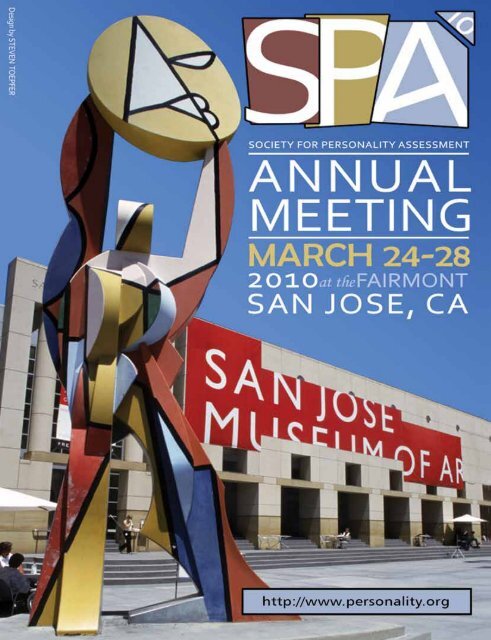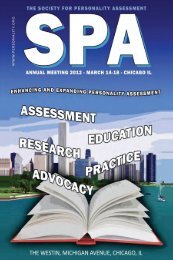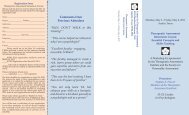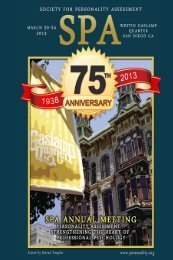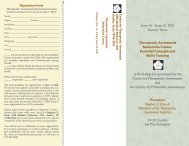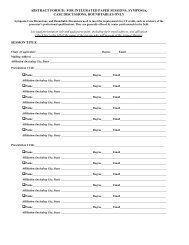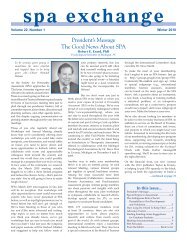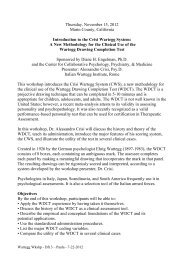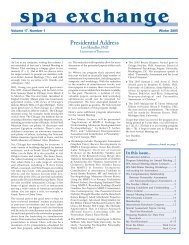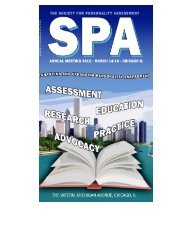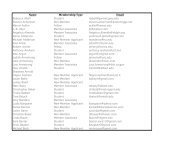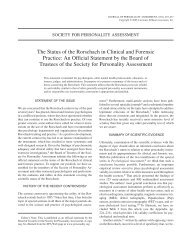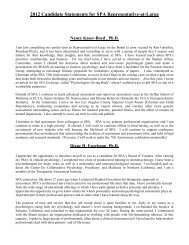From Routledge Journals - Society for Personality Assessment
From Routledge Journals - Society for Personality Assessment
From Routledge Journals - Society for Personality Assessment
Create successful ePaper yourself
Turn your PDF publications into a flip-book with our unique Google optimized e-Paper software.
<strong>From</strong> <strong>Routledge</strong> <strong>Journals</strong> . . .Members of the <strong>Society</strong> <strong>for</strong> <strong>Personality</strong> <strong>Assessment</strong> receive an electronic subscription to theJournal of <strong>Personality</strong> <strong>Assessment</strong> as a benefit of membership. There are many other SPA memberbenefits available – visit the web site at www.personality.org.Journal of <strong>Personality</strong> <strong>Assessment</strong>Official Journal of the <strong>Society</strong> <strong>for</strong> <strong>Personality</strong> <strong>Assessment</strong>www.personality.orgEDITORGregory J. MeyerUniversity of Toledo, Department of Psychology, Mail Stop #9482801 West Bancroft Street, Toledo, Ohio 43606-3390Email: gmeyer@UTNet.UToledo.eduASSOCIATE EDITORSSusan L. Crowley - Utah State UniversityRadhika Krishnamurthy - Florida Institute of TechnologyJohn E. Kurtz - Villanova UniversityStephen Strack - VA Ambulatory Care Center, Los AngelesThomas A. Widiger - University of KentuckyPUBLICATION DETAILSVolume 92, 2010, 6 Issues per yearPrint ISSN: 0022-3891 Online ISSN: 1532-77522008 IMPACT FACTOR 1.678The Institute <strong>for</strong> Scientific In<strong>for</strong>mation JournalCitation Report <strong>for</strong> 2008 ranks the Journal of<strong>Personality</strong> <strong>Assessment</strong> 17th out of 50 journals inSocial Psychology (Social Science) and 38th out of 88journals in Clinical Psychology (Social Science) withan Impact Factor of 1.678.© 2009 Thomson Reuters, Journal Citation Reports®WEB PAGE: www.tandf.co.uk/journals/HJPAThe Journal of <strong>Personality</strong> <strong>Assessment</strong> primarily publishes articles dealing with the development, evaluation, refinement,and application of personality assessment methods. Published six times a year, the journal features articles that addressempirical, theoretical, instructional, or professional aspects of using psychological tests, interview data, or the applied clinicalassessment process. The in<strong>for</strong>mation presented in the journal can also be used to advance the measurement, description, orunderstanding of personality, psychopathology, and human behavior.The Journal of <strong>Personality</strong> <strong>Assessment</strong> is broadly concerned with these issues:• Developing and using personality assessment methods in clinical, counseling, <strong>for</strong>ensic, andhealth psychology settings;• The assessment process in applied clinical practice;• The assessment of people of all ages and cultures;• Both normal and abnormal personality functioning.RECENT CONTENTSTesting the Effectiveness of Family Therapeutic <strong>Assessment</strong>: A Case Study Using a Time-Series Design,Justin D. Smith, Nicole J. Wolf, Leonard Handler, and Michael R. NashConstruct Validity of the Relationship Profile Test: Correlates of Overdependence, Detachment, and HealthyDependency in Low Income Urban Women Seeking Medical Services, Robert F. Bornstein, John H. Porcerelli,Steven K. Huprich, and Tsveti MarkovaFaking Good on the MCMI–III: Implications <strong>for</strong> Child Custody Evaluations, Paul Lenny and Greg E. DearMeasuring Clarity of and Attention to Emotions, Patrick A. Palmieri, M. Tyler Boden, and Howard BerenbaumMeasuring Individual Differences in Trait Sympathy: Instrument Construction and Validation, Sherman A. LeeValidity and Stability of the Youth Psychopathic Traits Inventory in a Non<strong>for</strong>ensic Sampleof Young Adults, Mary Ann Campbell, Naomi L. Doucette, and Sheila FrenchInvestigating the MMPI–2 Trauma Profile in Treatment-Seeking Peacekeepers,Arthur R. Rademaker, Rolf J. Kleber, Miranda E. Meijer, and Eric VermettenThe Rorschach Texture Response: A Construct Validation Study Using AttachmentTheory, Michael J. Cassella and Donald J. Viglione
SPA Boardof TrusteesRobert E. ErardPresidentRadhika KrishnamurthyPresident-ElectProgram ChairVirginia M. BrabenderPast PresidentCarol Groves OvertonSecretaryF. Barton EvansTreasurerGinger C. CallowayRepresentative-at-LargeRonald J. GanellenRepresentative-at-LargeDavid S. NicholsRepresentative-at-largeSteven SmithRepresentative-at-LargeGregory J. MeyerJPA EditorJed A. YalofSPA Exchange EditorBruce L. SmithPublic Affairs DirectorDear Fellow SPA Members:On behalf of the Board of Trustees of the <strong>Society</strong> <strong>for</strong> <strong>Personality</strong> <strong>Assessment</strong> (SPA), I inviteyou to join us March 24-28, 2010 <strong>for</strong> our annual Scientific Exchange and Workshops at thebeautiful Fairmont Hotel in San Jose, CA.Radhika Krishnamurthy, our President-Elect and Program Chair, and Ginger Calloway andher CE Committee have worked hard to select and arrange an excellent program. Ourtheme <strong>for</strong> 2010 is “<strong>Personality</strong> <strong>Assessment</strong> in Context.” The focus on context is intended tohighlight how we shape and adapt our theories, skills, and tools of personality assessment,and communicate our findings in ways that are well suited to the particular populations,audiences, settings, referral questions, and goals with which we are working.Throughout several days of attending the meetings and workshops in San Jose, you’ll, ofcourse, be able to keep up to date on the very latest ideas, instruments, and developments inyour areas of particular interest or expertise. You can also hobnob with familiar faces andfamous names at interest group lunches, consultation sessions, poster sessions, book signings,and receptions (not to mention our famously lively hallways). But we also encourage you tostretch a little. Learn something about an assessment technique you’ve never used be<strong>for</strong>e,try sitting in on a theoretical discussion with people of the ‘wrong’ orientation, find out howyour favorite instruments can be adapted to novel settings, check out innovations in teachingand research, have lunch and maybe plan a joint project or exchange of ideas with a colleaguefrom the other side of the world.No matter how you approach the meeting, I can guarantee that you’ll have some difficultchoices to make. Apart from our plenary sessions designed to be of interest to everyone,such as the Master Lectures by John Briere and Phil Erdberg, there may be 5 or moreworthwhile things to do at any given time—case discussions, presentations of research inprogress, roundtables on the future of practice, symposia on controversial topics. We’llprovide labels and mix up the topics to help you track your major interests throughoutthe conference; but any way you slice it, you’ll often find yourself wishing you could be intwo places at once.For in-depth coverage of topics of special interest, make sure you sign up <strong>for</strong> a workshopor two. In addition to a number that are suitable <strong>for</strong> all levels of experience, we’re goingto offer a few that are designed specifically <strong>for</strong> advanced audiences. We’ll have workshopsby John Briere, Phil Erdberg, Ronald Ganellen, Corine de Ruiter, Jeffrey Younggren,Arnold Bruhn, Christopher Hopwood, Sharon Rae Jenkins, Antoinette Thomas, BarryRitzler, Anthony Sciara, Reid Meloy, Mark Blais, David Streiner, Tad Gorske, DianeEngelman, Ellen Krantz, Richard Lewak, Robin Deutsch, Stephen Finn, Deborah Tharinger,Pamela Schaber, Jay Flens, Margaret Lee, Robert Kaufman, Nancy Olesen, MarjorieGans Walters, Steve Friedlander, John Sikorski, Graeme Hanson, and me.Come to San Jose and sharpen your skills, challenge your settled notions, feed yourcuriosity, widen your horizons, make new friends. Visit our website (www.personality.org)to register and try to make your hotel reservations early. Early registration will get youthe lowest registration fees and also ensure a hotel room in the deeply discounted blockthat we are holding <strong>for</strong> our attendees. To be sure there’s room <strong>for</strong> you in the workshopsof your choice, try to register <strong>for</strong> them, too, as soon as possible. This registration brochurelists all of the workshops, paper sessions, symposia, roundtables, and case presentationsscheduled <strong>for</strong> the meeting. A more detailed Program Book will be available online throughour web page after January 1, 2010. All registrants will receive a copy of the Program Book intheir registration packets.I look <strong>for</strong>ward to seeing you in March in San Jose, CA.Christopher HopwoodPresident, SPAGSRobert E. Erard Ph.D.President, SPA Board of Trustees
2010 SPA WORKSHOPS AND ANNUALWednesday, March 24, 20108:00 am - 4:00 pm Full-Day Workshops (4)(see description pp. 6-7)8:00 - 11:30 am Half-Day Workshops (2)(see description pp. 6-7)11:30 am - 1:00 pm Lunch Break1:00 - 4:30 pm Half-Day Workshops (2)(see description pp. 8-9)4:30 - 9:00 pm Board of Trustees Meeting5:00 - 8:30 pm Half-Day Workshop (1)(see description p. 9)Thursday, March 25, 20108:00 - 11:30 am Half-Day Workshops (5)(see description pp. 9-11)8:00 - 12:00 noon Board of Trustees Meeting11:30 am - 1:00 pm Lunch Break1:00 - 2:00 pm Consultation SessionsForensic Consultation [FO]J. Reid MeloyCollaborative/Therapeutic <strong>Assessment</strong>Consultation Constance T. Fischer [CT]Psychodynamic Case ConsultationMarshall L. SilversteinABAP Diplomate PreparationIrving B. Weiner2:00 - 3:00 pm Opening Plenary SessionPresidential AddressHow To Cook Without a Book (andhow not to)Robert E. Erard3:00 - 4:00 pm Bruno Klopfer AwardRoger L. Greene4:15 - 5:15 pm Master Lecture IThe <strong>Assessment</strong> of Trauma-Related SymptomatologyJohn N. Briere5:30 - 6:30 pm Hertz Memorial Presenationin memory of Jane Loevinger6:45 pm SPAGS Board Meeting/Dinner6:45 - 7:45 pm Book Signing6:45 - 8:00 pm President’s Welcome Reception6:45 - 8:00 pm Poster Session I<strong>Assessment</strong> with Diverse Populationsand SettingsFriday, March 26, 20107:30 - 8:30 am Journal Editorial Board Meeting Breakfast8:30 - 10:30 am Scientific SessionsPaper Session A : New Research on the MMPI-2Paper Session B: Rorschach Issues: Administration,Coding, and ValiditySymp C: Attachment in Child Custody Evaluations:The Missing Piece in an Integrative <strong>Assessment</strong>Symp D: Clinical Interpretation of the Rorschach:Using the CS and Content AnalysisSymp E: Recent Advances in Clinical and DiagnosticUses of the MCMI-III10:45 - 11:45 am Master Lecture IIGiving <strong>Personality</strong> <strong>Assessment</strong> AwayS. Philip Erdberg12:00 - 1:15 pm Lunch Break12:00 - 1:15 pm Lunchtime PresentationDoing Effective Oral and Written Presentations12:00 - 1:15 pm Lunchtime PresentationOperationalizing the BICS12:00 - 1:15 pm International Members Meeting12:00 - 1:15 pm Interest groups<strong>Assessment</strong> ResearchCollaborative/Therapeutic <strong>Assessment</strong> [CT]1:15 - 3:15 pm Scientific SessionsSymp F: Introducing Key Features of the RorschachPer<strong>for</strong>mance <strong>Assessment</strong> SystemSymp G: Forensic Psychological Evaluation inImmigration Court [FO]Paper Session H: Collaborative/Therapeutic<strong>Assessment</strong> Research [CT]Paper Session I: Advances in <strong>Assessment</strong> ofPathological NarcissicismPaper Session J: Assessing Response Distortionsand BiasesRoundtable K: Clinimetrics: A Challenge <strong>for</strong> PA3:30 - 5:30 pm Scientific SessionsRoundtable L: Psychological <strong>Assessment</strong> in thePublic Eye: Lessons from WikipediaPaper Session M: Play <strong>Assessment</strong>: Validation ofVersions of Affect in Play ScalePaper Session N: Cultural Competence andSensitivityPaper Session O: Choosing the Right Words: Verbaland Written Feedback in Therapeutic <strong>Assessment</strong>[CT]Symp P: Cross-In<strong>for</strong>mant <strong>Assessment</strong>5:45 - 7:00 pm Reception/AwardsWalter G. Klopfer Award TBAMartin Mayman Award TBASamuel J. and Anne G. Beck Award Matthew BaityMary Cerney Award Aidan G.C. Wright7:30 pm Dinner Honoring Irving B. WeinerSCIENTIFIC SESSION TRACKSFO = Forensic <strong>Assessment</strong>CT = Collaborative/Therapeutic <strong>Assessment</strong>4 / SPA Annual Meeting
MEETING: ASSESSMENT IN CONTEXTSaturday, March 27, 20107:30 - 8:30 am Exchange Editorial Board Breakfast8:00 - 10:00 am Scientific SessionsSymp A: Advances in Rorschach Per<strong>for</strong>mance<strong>Assessment</strong>: Part ISymp B: Multimethod <strong>Assessment</strong> of PsychologicalImpairment, Employability, and DisabilityPaper Session C: Assessing Trauma, Dissociation, andDefensesPaper Session D: Diversity Issues in <strong>Personality</strong><strong>Assessment</strong>Paper Session E: Forensic <strong>Assessment</strong> [FO]10:15 - 12:15 pm Scientific SessionsSymp F: <strong>Personality</strong> in Context of the DSM-VSymp G: Forensic Asssessment of Asylum Seekers [FO]Paper Session H: MMPI-2-RF StudiesPaper Session I: Advances in Rorschach Per<strong>for</strong>mance<strong>Assessment</strong>: Part IIPaper Session J: Per<strong>for</strong>mance-Based Measurement ofPsychopathology and Distress12:15 - 1:30 pm Lunch Break12:15 - 1:30 pm Student Lunch Leonard Handler12:15 - 1:30 pm Interest GroupsForensic Psychology [FO]Psychoanalytic <strong>Assessment</strong>12:15 - 1:30 pm <strong>Assessment</strong> Ethics ConsultatonRobert E. Erard1:30 - 3:30 pm Scientific SessionsRoundtable K: Wither the Rorschach: Revolution,Evolution, or Status Quo?Paper Session L: Application of <strong>Personality</strong> <strong>Assessment</strong> inSelection DecisionsPaper Session M: Assessing Traits, States, and LifeEventsPaper Session N: Collaborative/Therapeutic <strong>Assessment</strong>Applications with Children, Adolescents, and Families[CT]Paper Session O: Studies in AggressionPaper Session P: New and Established MeasuresSunday, March 28, 20108:00 am - 4:00 pm Full-Day Workshops (4)(see description pp.11-12)8:00 - 11:30 am Half-Day Workshops (1)(see description p. 12)ContentsProgram Schedule . . . . . . . . . . 4-5Workshops . . . . . . . . . . . . . . . 6-12Master Lecturers . . . . . . . . . . . . . 13Scientific Sessions . . . . . . . . . 13-18Awards and Tributes . . . . . . . . . 19Registration . . . . . . . . . . . . . . . . 20Continuing Education . . . . . . . . . 21Accommodations . . . . . . . . . . . . 223:45 - 5:45 pm Scientific SessionsPaper Session Q: <strong>Assessment</strong> of Sex Offenders [FO]Paper Session R: Use of Music in Per<strong>for</strong>mance-Based<strong>Assessment</strong>Paper Session S: Duquesne Life-World RorschachResearch and First Semester Life-World <strong>Assessment</strong>sSymp T: Integrating Attachment into Clinical Practice:Nuts and BoltsSymp U: Contributions from <strong>Personality</strong> <strong>Assessment</strong> tothe Development of Axis II in DSM-VStudent Activities . . . . . . . . . . . . 23Volunteers . . . . . . . . . . . . . . . . . 22Consultations . . . . . . . . . . . . . . . 246:00 - 7:00 pm Farewell Reception <strong>for</strong> Journal Reviewers6:00 - 7:00 pm Poster Session IIPsychometric/Methodological Studies andOther Empirical InvestigationsInternational Committee . . . . . . 24Interest Groups . . . . . . . . . . . . . 25Employment Fair . . . . . . . . . . . . 25To register visit: www.personality.org / 5
2010 WORKSHOPS - MARCH 24Wednesday, March 24, 20108:00 am - 4:00 pmFull-Day, 7 CE CreditsWorkshop #1Trauma-Relevant Psychological <strong>Assessment</strong>John N. Briere, Ph.D.Keck School of Medicine, University of Southern Cali<strong>for</strong>nia,Los Angeles, CAThis workshop will outline the primary symptoms and disordersassociated with trauma exposure (including “complex” traumainvolving child abuse and neglect) and will describe generic andtrauma-specific assessment instruments relevant to traumatizedindividuals. These will include standardized measures of posttraumaticstress, dissociation, impaired self-reference, affectdysregulation, “acting out” (tension reduction) behaviors, andrelational issues, as well as possible comorbidities such as anxiety,depression, and substance abuse. A number of the presenter’spublished instruments will be discussed in greater detail.Goals and Objectives:1. Outline the major psychological effects of acute and earlytrauma exposure.2. Describe ways in which generic measures such as the PAIand MMPI-2 can be used to understand traumatized individuals.3. List at least four standardized, trauma-specific psychologicaltests.4. Describe the general notion of “assessment-based treatment.”Skill Level: This is an intermediate level workshop.Workshop #2Using Emerging and Existing Data to ImproveRorschach Validity and UtilityDonald J. Viglione, Ph.D.Alliant International University, San Diego, CAGregory J. Meyer, Ph.D.Joni L. Mihura, Ph.D.University of Toledo, Toledo, OHWe present the Rorschach Per<strong>for</strong>mance <strong>Assessment</strong> System(RPAS) as a reliable, valid, useful, and manageable way of usingthe Rorschach internationally in applied practice. We describethe scientific rationale and procedures <strong>for</strong> the new RPAS, addressingadministration; inquiry; the selection, scoring, and computationof variables; <strong>for</strong>m quality; normative referencing; a standardized<strong>for</strong>mat to present the results; and interpretive inferences.The system is built upon a solid research foundation,making use of the best supported variables in the Rorschachliterature, and an appreciation of the Rorschach task as providinga sample of behavioral per<strong>for</strong>mance. We review relevantevidence from several of our studies, to which many SPA membersand colleagues around the world contributed. The selectionof variables and interpretive guidelines derive from a systematicreview of the Rorschach validity literature, surveys of cliniciansabout the usefulness of indices and variables, and a conceptual6 / SPA Annual Meetingunderstanding of the processes involved in generating test responses,as well as concerns about redundancy and parsimony.Thus, RPAS emphasizes scores in which the phenomenology ofthe coded response parallels the phenomenology of the inferredreal-world behavior or personality characteristic being assessed.This workshop should be useful <strong>for</strong> practitioners and <strong>for</strong> peoplewho teach or conduct research on personality assessment.Currently, the RPAS focuses on using the Rorschach with adolescentsand adults, although some considerations regardingits use with children will be offered. Attendees should be familiarwith the Rorschach and will receive preliminary RPAS materials<strong>for</strong> administration, scoring, and interpretation.Goals and Objectives:1. Describe the basic concept of response phenomenologyand its relationship to construct validity.2. Recognize critical components of the scientific foundationof the Rorschach Per<strong>for</strong>mance <strong>Assessment</strong> System.3. Use the materials provided to per<strong>for</strong>m basic administration,scoring, and norming procedures with the RPAS.4. Describe the principles of variable selection <strong>for</strong> inclusion inthe RPAS.5. Describe the basic interpretive principles and use materialsprovided to be able to produce sound interpretive inferences.Skill Level: Participants should have some familiarity with Rorschachadministration, scoring, and interpretation.Workshop #3Forensic <strong>Assessment</strong> of Violent Offenders: Sex,Lies, and VideotapesRonald J. GanellenNorthwestern University, Chicago, ILCorine de RuiterMaastricht University, The NetherlandsPsychologists are often asked to evaluate individuals involvedin the criminal justice system. Because of the wide range ofquestions asked in <strong>for</strong>ensic contexts, it is not realistic to expectany one psychological instrument to adequately address allrelevant psychological issues, such as the presence of a psychoticdisorder or the risk of future aggressive behavior. Onedimension of psychological functioning to consider whenevaluating criminal offenders is psychopathy. Psychopathy is apersonality construct independent of any diagnosis containedin the DSM-IV. Psychopathy is not directly measured by traditionalpsychological measures. The PCL and PCL-R were developedto identify and rate the severity of psychopathic characteristicsand are widely used in <strong>for</strong>ensic and correctional settings. Theycan provide valuable in<strong>for</strong>mation as prisoners identified by thePCL-R as psychopaths exhibit more aggressive and disruptivebehavior while in prison than non-psychopathic prisoners; havea less favorable response to psychological treatment; and, whenreleased from prison, are at greater risk <strong>for</strong> recidivism. Duringthis intermediate level workshop, we will review administration,scoring, and interpretation of the PCL-R, and discuss similaritiesand differences in the definitions of psychopathy and Antisocial
<strong>Personality</strong> Disorder. Cases of prisoners who committed seriousoffenses, each of whom was administered the PCL-R, MMPI-2,and Rorschach, will be presented to illustrate how findingsfrom the PCL-R can be integrated with findings from the MMPI-2 and Rorschach. The strengths and limitations of eachinstrument will be discussed. Brief videotapes of these offenderswill be shown so workshop participants can <strong>for</strong>m a vivid “mentalpicture” of what these offenders are like.Goals and Objectives:1. Review the conceptualization of psychopathy.2. Describe administration, scoring, and interpretation of thePCL-R.3. Discuss similarities and differences in the definitions ofpsychopathy and Antisocial <strong>Personality</strong> Disorder.4. Illustrate ways to integrate findings from the PCL-R withfindings from the MMPI-2 and Rorschach.5. Identify strengths and limitations of each instrument <strong>for</strong>specific assessment issues in <strong>for</strong>ensic contexts.Skill Level: This is an intermediate level workshop.Workshop #4Legal Ethical Risks and Ethical Risk Managementin Professional Psychological PracticeJeffrey N. Younggren, Ph.D.University of Cali<strong>for</strong>nia, Los Angeles School of Medicine,Los Angeles, CAFor the last ten years, there has been a major increase in thenumber of lawsuits, licensing board complaints, and ethics committeecomplaints against clinical psychologists. As managedcare continues to dominate third party reimbursement in boththe private and public sectors, any adverse disciplinary eventcan make it difficult, if not impossible to meet credentialingrequirements. The changes in the economic system have ledto changes in therapeutic approaches and business organizationsthat, in turn, have increased the complexity of the legaland regulatory environment. In these difficult times, a riskmanagement strategy is an essential element of professionalpractice. After providing a basic introduction to identifying legaland ethical risks involved in working with high risk patientsand situations, this workshop will focus on three specializedareas of practice: working with couples and families, involvementwith lawyers and the legal system, and working withpotentially suicidal clients. The primary workshop goal is toallow practitioners to identify potential legal and ethical problemsin these areas so that risks of lawsuits and disciplinarycomplaints can be minimized. Dr. Younggren will suggest strategieswhich will make it more likely that a psychologist willprevail if she/he is un<strong>for</strong>tunate enough to be the target of thesesometimes unavoidable events. The program will describe howand when practitioners can utilize the APAIT Advocate 800Risk Management Consultation Service as part of their ownrisk management strategies. The workshop is primarily directedto psychologists in private practice but it applicable to all siteswhere health services are provided.2010 WORKSHOPS - MARCH 24Goals and Objectives:1. Provide basic strategies <strong>for</strong> identifying high risk situations andmanaging professional practice risks.2. Describe how to manage interactions with lawyers and the legalsystem, including responding to subpoenas and other in<strong>for</strong>mationrequests, providing testimony at depositions and in court, and usingstrategies <strong>for</strong> interacting with attorneys.3. Describe how to manage potential conflicts in conjoint treatmentwith couples and families, with particular emphasis on thespecial risks associated with divorce.4. Prepare essential risk management strategies <strong>for</strong> identifyingand managing outpatient suicide risk.5. Describe ethical and legal standards governing these areas ofpractice.Skill Level: The workshop is primarily directed to psychologists inprivate practice, but it is applicable to all sites where health sciencesare provided.Wednesday, March 24, 20108:00 am - 11:30 amHalf-Day, 3.5 CE CreditsWorkshop #5An Introduction to Early Memories ProcedureInterpretationArnold R. Bruhn, Ph.D.Chevy Chase, MDThe Early Memories Procedure (EMP) is best used at the beginningof therapy to assess major unresolved issues that have unconsciouslymotivated the client to seek therapy at this time. Thus thepresenting problem (“I’ve been depressed <strong>for</strong> six months”) can beviewed from a more relevant perspective (memory issue: ‘Peopleclose to me keep dying or leaving me’). Often clients lack insight asto what is causing their lives not to work, and we as clinicians mustdeduce the dysfunction be<strong>for</strong>e we can be of much help.The EMPwas designed with a two major purposes in mind: to help cliniciansfigure out by the end of the second session what really broughttheir client in to therapy; and just as important, to help clientsbetter understand how they function and ‘what is wrong with them’—to teach psychological mindedness, in so many words. Secondarily,such work demystifies the work of psychotherapy and reducesunproductive anxiety—the client’s feeling helpless and out ofcontrol. Proceeding in this manner helps to build trust in their therapistand the therapy process—by the end of the second session,clients know why they are there, what in their lives is not working,and what they must do to make things right. Once clients understandwhat the problem is, they are less likely to drop out andmore likely to believe the therapist knows what s/he is doing.Goals and Objectives:1. Provide a structured method to interpret memories reliably (asine qua non of the scientific method).2. Introduce the EMP and discuss how to use it at the beginningof therapy.3. Identify the major unresolved issue that brought the clientinto therapy.To register visit: www.personality.org / 7
2010 WORKSHOPS - MARCH 244. Sketch out how the major unresolved issue can beconceptualized three dimensionally—what is the issue, how itcame to be a problem, and what keeps it unresolved now.5. Illustrate how the therapist can help the client to resolvethe major unresolved issue.Skill Level: Participants are assumed to have some foundationalunderstanding of autobiographical memories and howsuch memories are chosen, emergized, and shaped bypersonality dynamics.Workshop #6Advanced <strong>Personality</strong> <strong>Assessment</strong> InventoryInterpretationChristopher J. Hopwood, Ph.D.Michigan State University, East Lansing, MIThe purpose of this workshop is to outline advanced interpretivestrategies <strong>for</strong> the <strong>Personality</strong> <strong>Assessment</strong> Inventory. Threebroad areas of interpretation will be discussed, including issuesrelated to the interpretation of profile validity, psychiatricdiagnosis, and the assessment of risk <strong>for</strong> harm to self or othersor treatment-related problems. The PAI includes multiple scalesand indicators of response sets that could affect the validity ofthe clinical profile. These include indicators of random respondingand both negative and positive dissimulation. Within negativeand positive dissimulation, indicators vary in the degree towhich they reflect covert influences related to psychopathologyand overt ef<strong>for</strong>ts to distort the profile. An empirically-basedmodel <strong>for</strong> interpreting these indicators will be described usingclinical cases. Further, strategies <strong>for</strong> better understanding theinfluences of response sets on the rest of the PAI profile will beoffered. Several empirical and conceptual methods <strong>for</strong> developingpsychiatric diagnoses with the PAI have been developed.Each of these methods will be described in the context of previouslycollected PAI data, and a model <strong>for</strong> developing diagnostichypotheses with the PAI that goes beyond an enumerationof the most elevated clinical scales will be described. The PAIhas a number of scales and indicators designed to assess riskssuch as self-harm, other-harm, and problematic treatment process.Recent research on the validity of these methods will bereviewed and used to in<strong>for</strong>m strategies <strong>for</strong> clinical assessmentof risk with the PAI, which will be further illustrated using clinicalcase material.Goals and Objectives:1. Describe the development of PAI indicators of responsesets, diagnosis, and risks to harm self or others or <strong>for</strong> problematictreatment process.2. Review empirical research on these indicators.3. Outline interpretive strategies <strong>for</strong> using the PAI to assessthese issues in clinical practice.Skill Level: Participants should be familiar with the PAI.Wednesday, March 24, 20101:00 pm - 4:30 pmHalf-Day, 3.5 CE CreditsWorkshop #7Quantitative Relationships Approaches toStorytelling Techniques: Validity, Evidence, andApplicationSharon Rae Jenkins, Ph.D.University of North Texas, Denton, TXAntoinette D. Thomas, Ph.D.St. Lambert, Quebec, CanadaTo understand people’s problems in their interpersonal relationships,this story scoring approach describes relationshipsof characters in TAT stories. Clearly defined content analysiscategories are applied to each story, and scores describe thecontent found. Each relationship receives one score describingits affective valence and another score <strong>for</strong> the complexity ofcognitive perspective-taking (“taking the role of the other”).These scores come from manuals recently published, alongwith research summaries, in the Handbook of Clinical ScoringSystems <strong>for</strong> Thematic Apperceptive Techniques. Attendees willlearn about the research, then practice these scoring techniquesby studying examples and applying the systems to stories scoredby experts. Thomas’s Affective Scale scores each relationshipbetween -2 and +2 to describe the relationship’s affective valence.The difference between scores <strong>for</strong> spousal relationshipsand other relationships (especially parental) distinguishes happilymarried couples from those less happily married (Thomas& Dudek, 1985). In a clinic sample, positive Parent scores wereassociated with fewer family of origin complaints (Jenkins &Thomas, 2007). Feffer’s Interpersonal Decentering Systemscores interactions between characters on a 9-point scale ofincreasing complexity and coordination of perspectives, fromundifferentiated through sequential interaction to simultaneousin<strong>for</strong>mation processing (requiring internalization of both selfand other). High scorers are better at differentiating charactersand perspectives in Feffer’s Role-Taking Task (Feffer &Jahelka, 1968); violence perpetrators scored lower than otheroutpatients (Jenkins, Dobbs, & Leeper, 2005).Goals and Objectives:1. Give a general orientation to theory and applications of relationshipsscoring of storytelling techniques;2. Introduce the primary validation evidence <strong>for</strong> two relationshipsstory scoring systems.3. Ensure introductory competence in scoring and interpretingtwo relationships TAT scoring systems.Skill Level: The minimum skill level is graduate studentstatus with one course in personality assessment that includesthe TAT, another storytelling technique, or the RorschachComprehensive System.8 / SPA Annual Meeting
Workshop #8The Rorschach Comprehensive System: Codingand AdministrationBarry Ritzler, Ph.D.Long Island University, NYAnthony Sciara, Ph.D.Asheville, NCThe workshop will cover advanced coding issues that frequentlypuzzle the Rorschach psychologist. Since proper administrationof the method reduces the difficulty of coding decisions, Dr.Sciara will begin by reviewing proper administration procedures.Next, Dr. Ritzler will provide guidelines <strong>for</strong> several difficult codingdecisions. Dr. Sciara’s presentation will outline proper administrationprocedures to assure precision and standardizationof the Comprehensive System. Dr. Ritzler will cover difficultcoding issues such as FC versus CF, active versus passive movement,shading determinants, and special scores. Both presenterswill discuss the addition of certain enhancement variablesthat have been included in the Rorschach Training Programworkshops. These variables include the Rorschach Oral DependencyScale and Aggressive Content.Goals and Objectives:1. Improve administration skills, particularly inquiry, to providemore effective, necessary in<strong>for</strong>mation <strong>for</strong> correct scoring.2. Provide guidelines <strong>for</strong> making difficult scoring decisions.3. Familiarize participants with Comprehensive System enhancementvariables.4. Answer questions participants have about coding and administrationissues.Skill Level: Participants must be familiar with the RorschachComprehensive System through at least one semester’s graduatetraining or the equivalent.Wednesday, March 24, 20105:00 pm - 8:30 pmHalf-Day, 3.5 CE CreditsWorkshop #9The Black Swan: Threat <strong>Assessment</strong> of LowFrequency High Intensity ViolenceJ. Reid Meloy, Ph.D.Forensis, San Diego, CA2010 WORKSHOPS - MARCH 25Low frequency high intensity violence, such as acts of terrorism,mass murder, and public assassinations, cannot be predicted,but their risk can be reduced. Dr. Meloy will present anidiographic model which depends upon the identification of apathway to violence—dynamic factors, markers, speed, direction—andprovides a functional and behavioral approach to discerningvariables associated with such acts of instrumental orpredatory aggression. The approach differs conceptually andoperationally from the traditional nomothetic approach to violencerisk assessment, and has been widely adapted by threatassessment teams in the US and Western Europe, whether university,corporate, or government based.Goals and Objectives:1. Describe the four approaches to violence risk assessment,including the idiographic approach taught in this class.2. Describe a pathway to violence.3. Describe markers along a pathway to violence.4. Explain how this approach has been applied to low frequencyhigh intensity acts of violence, such as mass murder and publicassassinations.Skill Level: This workshop is appropriate <strong>for</strong> all graduatestudents and Ph.D./Psy.D. psychologists.Thursday, March 25, 20108:00 am - 11:30 amHalf-Day, 3.5 CE CreditsWorkshop #10<strong>Personality</strong> Focused <strong>Assessment</strong>:An IntroductionMark A. Blais, Ph.D.Psychology <strong>Assessment</strong> Center, Boston, MAPsychological assessment requires moving beyond simple scorebehaviorrelationships and using multi-source data to describecomplex human behaviors (Handler & Meyer, 1998). Many believethat the integration of personality theory along with assessmentknowledge and skill is required to achieve this level of proficiency.This workshop on <strong>Personality</strong> Focused <strong>Assessment</strong> (PFA),presents an approach to psychological assessment that uses amodern model of personality to enhance data organization andintegration. Specifically PFA uses a trans-theoretical model ofpersonality, in<strong>for</strong>med by Mayer’s systems framework (1998 &2005), to articulate the major sub-divisions and organizationpersonality and explicitly relates assessment findings to featuresof the model. PFA has been used to teach advanced psychologicalassessment to psychology interns and post doctoral fellows<strong>for</strong> the last decade and has recently been presented in a numberof book chapters (Blais and Smith, 2008 & Blais and Hopwood, inpress). This workshop will provide a general overview of thetrans-theoretical model of personality and demonstrate specificallyhow assessment data from commonly used instruments(Rorschach, <strong>Personality</strong> <strong>Assessment</strong> Inventory and NEO-<strong>Personality</strong>Inventory Revised) can be aligned with the model to providea personality focused organization and integration of findings.Clinical examples will be used to illustrate the potential PFA holds<strong>for</strong> producing dynamic, integrated assessment <strong>for</strong>mulations thatplaces the person at the center of our assessment reports.Goals and Objectives:1. Present a trans-theoretical model of personality organizationand demonstrate how the model may be used to improve theorganization, integration and interpretation of common psychologicalassessment data.To register visit: www.personality.org / 9
2010 WORKSHOPS - MARCH 252. Relate data from three popular psychological instruments,<strong>Personality</strong> <strong>Assessment</strong> Inventory, NEO-<strong>Personality</strong> Inventory Revisedand Rorschach Inkblot Method, to the model of personality.3. Use clinical examples to demonstrate how the personalitymodel can guide and enhance the organization and integrationof multi-source assessment data.Skill Level: This is an intermediate level workshop.Workshop #11Meta-Analysis <strong>for</strong> CliniciansDavid L. Streiner, Ph.D.Baycrest Centre and the University of TorontoToronto, CanadaMeta-analysis is a technique <strong>for</strong> combining the results of manystudies in a rigorous and systematic way. It was first used tolook at studies of treatment effectiveness, but has recently beenextended to include studies of the reliability and validity of scales,under the names of ‘reliability and validity generalization.’ Thisworkshop will enable participants to evaluate and/or conductmeta-analyses in both of these areas.Goals and Objectives:1. Go through the steps necessary to conduct a meta-analysisand generalization study.2. Evaluate how well a meta-analysis has been done.3. Calculate reliability and validity generalization coefficients.Skill Level: This workshop is an introductory course instatistics and psychometrics.Workshop #12Case Studies in Collaborative NeuropsycholgyTad Gorske, Ph.D.University of Pittsburgh School of MedicinePittsburgh, PADiane Engelman, Ph.D.Center <strong>for</strong> Collaborative Psychology and PsychiatryKentfield, CAEllen Krantz, Ph.D.Corte Madera, CATherapeutic Neuropsychological <strong>Assessment</strong> (CTNA, Gorske andSmith, 2009) has been developed to fill the void that often existsin the practice of neuropsychological assessment, the provisionof objective and personalized feedback that builds rapport withpatients and lets their voices be heard in the interpretation anddecision-making process. This client-centered approach hasshown to lead to more patient centered interventions, bettercompliance, and stronger recovery. CTNA blends the conceptualframework of Therapeutic/Collaborative <strong>Assessment</strong> Modelsand Motivational Interviewing Principles and methods. Thisworkshop will present the background and methodsof CTNA principlesand provide case examples of collaborative approachesin neuropsychological assessment. The case examples will10 / SPA Annual Meetingillustrate CTNA’s utility in a complicated case with a man diagnosedwith dual attention deficit and executive functioning difficulties,pediatric neuropsychological assessment,and brain injuryrehabilitation.Goals and Objectives:1. Discuss the principles and background of CollaborativeNeuropsychology.2. Describe the methods of a Collaborative Neuropsychologyfeedback session.3. Discuss how Collaborative Neuropsychology methods areused in different case examples and clinical situations.4. Describe how Collaborative Neuropsychology methods canimprove patient-practitioner rapport, treatment adherence, differentialdiagnosis, and develop realistic and applicable treatment/rehabilitationplans.Skill Level: This is an intermediate to advanced level workshop.Workshop #13Live Demonstration: Positive Marital FeedbackUsing the MMPI-2Richard Lewak, Ph.D.Del Mar Clinic, Del Mar, CAThe workshop is a live demonstration of how the MMPI-2 canbe used to provide couples with concrete positive feedback aboutthe dynamics of their relationship. The presenter will show howMMPI-2 data can provide a couple with insight into how theirearly conditioning experiences and personality traits can leadto recurring marital conflicts. Marital therapy techniques developedusing MMPI-2 data will also be demonstrated. Volunteercouples will be solicited over the internet and a suitable couplewill be given live feedback during the workshop. Should thatnot be possible because a volunteer couple is not available, avideo from a pre-recorded couples feedback will be shown.The first hour of the workshop will discuss the Positive Psychology-influencedfeedback paradigm. The second hour will eitherbe a live feedback or a video of a pre-recorded feedback session.The third hour will provide a analysis of the feedback sessionand identify the structure of positive marital feedback sessions.It will close with participants’ questions.Goals and Objectives:1. Outline a Positive Psychology-influenced paradigm <strong>for</strong> givingcouples feedback from MMPI-2 data.2. Demonstrate how MMPI-2 data, normally described in pathologicalterms, can be re<strong>for</strong>mulated in positive yet accurate ways.3. Demonstrate how MMPI-2 data can be used to create Gestaltexercises in a feedback session.4. Demonstrate the power of MMPI-2 data as an aid in understandingcouples enduring patterns of relating.Skill Level: Participants should have a basic understanding ofthe MMPI-2.
Workshop #14<strong>Assessment</strong> of Domestic Violence in ChildCustody DisputesRobin Deutsch, Ph.D.Massachusetts General Hospital, Department of PsychiatryBoston, MAIn the past, views on domestic violence resulted in polarization inthe professional community as dissimilar contexts and sampleswere compared. There is increasing acknowledgment among familycourt professionals, custody evaluators, and domestic violenceadvocates that not all domestic violence is the same and the differencesin the use of violence in<strong>for</strong>m custodial and access decisions.This workshop will review these differences with a focus on methodsof assessing violence risks, and the implications <strong>for</strong> childrenand parenting plans. There will be a review of violence risk assessmentinstruments, new research on and thinking about differentiationof domestic violence, and the impact of domestic violenceon parenting practices and child adjustment. Case vignetteswill be used.Goals and Objectives:1. Differentiate types of domestic violence in custody disputes.2. Identify violence risk factors.3. Discuss the ramifications of domestic violence on parenting practices.4. Identify implications of violent behaviors <strong>for</strong> parenting plans.Skill Level: This workshop is appropriate <strong>for</strong> all levels of expertise.Sunday, March 28, 20108:00 am - 4:00 pmFull-Day, 7 CE CreditsWorkshop #15Therapeutic <strong>Assessment</strong> of Adolescents andFamilies2010 WORKSHOPS - MARCH 28Stephen E. Finn, Ph.D.Pamela Schaber, Ph.D.Center <strong>for</strong> Therapeutic <strong>Assessment</strong>, Austin, TexasDeborah Tharinger, Ph.D.University of Texas, Austin, TXPsychological assessment of adolescents is challenging <strong>for</strong> manyreasons, including the difficulty of engaging reluctant teens in anassessment, managing issues of confidentiality and autonomy, andmaintaining an alliance with adolescents and their caregivers simultaneously.Drs. Finn, Schaber, and Tharinger will explain howthe collaborative process of Therapeutic <strong>Assessment</strong> meets eachof these challenges and aims to benefit adolescents and theircaregivers simultaneously. In addition to didactic material, the presenterswill show video excerpts from several different adolescent/familyassessments.Goals and Objectives:1. Discuss how developmental issues of adolescents make psychologicalassessment challenging.2. Discuss how psychological assessment of adolescents ispotentially a family intervention.3. List the steps in Therapeutic <strong>Assessment</strong> with adolescents.4. Describe guidelines <strong>for</strong> managing confidentiality in adolescentassessments and <strong>for</strong> respecting teens’ appropriate needs<strong>for</strong> autonomy.5. Discuss ways to involve caregivers in an adolescent’s assessment.6. Describe various ways to give feedback to teens about theirassessment results.Skill Level: This is an introductory workshop; participantsshould have a basic knowledge of standardized psychologicaltests.Workshop #16Advanced Issues in Child Custody: CurrentResearch, <strong>Assessment</strong>, and Forensic ApplicationsS. Margaret Lee, Ph.D.Robert Kaufman, Ph.DMill Valley, CANancy Olesen, Ph.D.Marjorie Gans Walters, PhD.San Rafael, CASteven Friedlander, PhD.John Sikorski, MDGraeme Hanson, MDSan Francisco, CAThis workshop will address issues frequently faced when conductingchild custody evaluations. The topics will include: attachment,alienation, sexual abuse and personality disorders,particularly in their neurodevelopmental aspects. Each topicalpresentation will include a review of the recent pertinent research,appropriate assessment instruments found to be useful,and the integration of assessment findings with other datacollected in this <strong>for</strong>ensic application.Goals and Objectives:1. Describe elements of basic research in sexual behavior foundin non-abused children of different ages.2. Describe research on aspects of memory in children, bothneurobiological development and situations that increase or decreasethe accuracy of recall.3. Present an example of interaction between constitutionalfactors and environmental factors in personality <strong>for</strong>mation.4. Review current perspectives on alienation and on childrenwho refuse to spend time with or reject a parent after divorce.5. Identify and assess the various factors that contribute to achild’s rejection of a parent.6. Adjust standard evaluation processes to obtain better attachmentdata and will be introduced to attachment measures<strong>for</strong> adults and children.Skill Level: Participants should have a basic understandingof divorce and per<strong>for</strong>ming child custody evaluations.To register visit: www.personality.org / 11
2010 WORKSHOPS - MARCH 28Workshop #17Multimethod <strong>Assessment</strong> of <strong>Personality</strong>DisorderS. Philip Erdberg, Ph.D.University of Cali<strong>for</strong>nia, San Francisco, CA<strong>Personality</strong> disorders can be understood as extreme manifestationsof characteristics that cause difficulties in someone’spersonal and vocational life. Multimethod assessment of thesedisorders allows a level of understanding that can lead to appropriateintervention planning and monitoring. This workshoppresents a model <strong>for</strong> multimethod assessment based on thedimensional assumption that personality disorders lie at theextreme of normal personality function and are best assessedwith instruments whose primary focus is personality as opposedto psychopathology. A substantial personality disorderliterature has developed <strong>for</strong> both the Rorschach the NEO-PI-R,and the combination of a per<strong>for</strong>mance-based and a self-reportinstrument provides the precision necessary <strong>for</strong> clinically relevantassessment. This workshop begins with a review of Rorschachand Five-Factor Model personality disorder findings andcontinues with a series of case vignettes that illustrate thecombined use of the Rorschach and the NEO-PI-R in a varietyof clinical and <strong>for</strong>ensic settings.Goals and Objectives:1. Describe the distinction between dimensional and categoricalapproaches in the description of personality disorder.2. Understand the Rorschach’s approach to multiphasicpersonality description.3. Describe the approach that the Five-Factor Model takes todescribing the various core components of personality.4. Review the personality disorder literature that hasdeveloped in the last two decades <strong>for</strong> both the Rorschachand the NEO-PI-R.5. Illustrate how combining the Rorschach and the NEO-PI-Rcan lead to assessments that are relevant in interventionplanning and monitoring.Skill Level: Participants should have basic training and experiencewith the Rorschach Comprehensive System.Workshop #18The Use of the MMPI-2 and MCMI-III in ForensicPractice: “What’s All the Fighting About?”12 / SPA Annual MeetingJames R. Flens, Ph.D.Brandon, FLThis full day presentation will address the use of the MMPI-2and the MCMI-III in <strong>for</strong>ensic practice. Particular emphasis willwill be placed on updates and changes in the MMPI-2 andMCMI-III, the impact on the use of these instruments in <strong>for</strong>ensicpractice, and issues associated with admissibility of theseinstruments by the Court [i.e., Daubert and Frye issues]. Severalof the recent changes in the MMPI-2 and the MCMI-IIIhave generated controversies and heated debate within thefield of assessment psychology. These changes and controversieswill be discussed with particular emphasis on what impactthey have <strong>for</strong> day-to-day use of these instruments within the specialtyof <strong>for</strong>ensic psychology.Goals and Objectives:1. Review recent developments in the MMPI-2 and MCMI-III andthe impact on admissibility issues.2. Review the various controversies generated by these recentdevelopments and their impact on use in <strong>for</strong>ensic contexts.3. Recognize the importance of the context of the evaluation andresponse style in interpreting a test profile.4. Recognize the issues associated with using a computergenerated test interpretation report in a <strong>for</strong>ensic setting.Skill Level: This is a moderate to advanced skill level presentation.Sunday, March 28, 20108:00 am - 11:30 amHalf-Day, 3.5 CE CreditsWorkshop #19Bringing Rorschach Protocols to LifeRobert E. Erard, Ph.D.Psychological Institutes of Michigan, Franklin, MIMost Rorschach workshops focusing on clinical interpretation beginwith brief case histories, followed by analysis of the structuralsummaries, occasionally with a little follow-up data added on.What is usually left out is a feel <strong>for</strong> what it is like to be with thatperson—how do these abstract notions about an individual’s personalityactually play out in his or her everyday life? In this workshop,we will do things exactly backwards. We will look at structuralsummaries that have been designed (by “reverse engineering”)to highlight certain personality features and qualities in variouscombinations and then listen to “conversations” with peoplewho seem to fit those summaries. The “conversations” will bedrawn (with permission) from the archives of WireTap, a Canadianradio comedy featuring actors who are remarkably gifted atvividly portraying various kinds of character pathology. The workshopwill strive to achieve an optimal balance of enlightenmentand entertainment.Goals and Objectives:1. Recognize and appreciate how key findings from Rorschachstructural summaries can be used to develop a complex and integratedpicture of personality.2. Listen <strong>for</strong> indications of particular types of personality pathologyin “live conversation.”3. Hone intuitions about how various abstract psychological constructsactually manifest in everyday life and how “reverse engineering”of Rorschach constructs can contribute to this awareness.Skill Level: Participants should be familiar with the elements ofRorschach CS interpretation and have a basic knowledge ofcharacter pathology.
2010 SCIENTIFIC SESSIONSDeveloping Tests and Methods of <strong>Personality</strong> <strong>Assessment</strong>Advancing the Science & Practice of <strong>Personality</strong> <strong>Assessment</strong>Promoting Ethical & Responsible Use of<strong>Personality</strong> <strong>Assessment</strong>Master LecturesMaster Lecture I: John N. Briere, Ph.D., is Associate Professor of Psychiatryand Psychology at the Keck School of Medicine, University of Southern Cali<strong>for</strong>nia, andDirector of the Psychological Trauma Program at LAC-USC Medical Center. He is a pastpresident of the International <strong>Society</strong> <strong>for</strong> Traumatic Stress Studies (ISTSS), and recipientof the Robert S. Laufer Memorial Award <strong>for</strong> Scientific Achievement from ISTSS.Designated as “Highly Cited Researcher” by the Institute <strong>for</strong> Scientific In<strong>for</strong>mation, he isauthor or co-author of over 70 articles, 20 chapters and encyclopedia entries, and 10books in the areas of trauma, child abuse, and interpersonal violence. He has developed8 psychological tests, including the Trauma Symptom Inventory (TSI), Detailed<strong>Assessment</strong> of Posttraumatic Stress (DAPS), Trauma Symptom Checklist <strong>for</strong> Children(TSCC), Trauma Symptom Checklist <strong>for</strong> Young Children (TSCYC), and the Inventoryof Altered Self-Capacities (IASC), all of which are published by Psychological <strong>Assessment</strong>Resources. He presents workshops on trauma assessment and treatment nationallyand internationally. His website is www.JohnBriere.com.The <strong>Assessment</strong> ofTrauma-RelatedSymptomatologyGiving <strong>Personality</strong><strong>Assessment</strong> AwayMaster Lecture II: S. Philip Erdberg, Ph.D., is a diplomate in clinical psychologyof the American Board of Professional Psychology. Dr. Erdberg’s longstandinginterest is in using personality assessment to provide consultation <strong>for</strong> intervention. Heis a past-president of the <strong>Society</strong> <strong>for</strong> <strong>Personality</strong> <strong>Assessment</strong>, the 1995 recipient of the<strong>Society</strong>’s Distinguished Contribution Award, and the 2001 recipient of the OutstandingAchievement Award of the Forensic Mental Health Association of Cali<strong>for</strong>nia. Dr. Erdbergis a faculty member of the San Francisco Center <strong>for</strong> Psychoanalysis and. an assistantclinical professor at the University of Cali<strong>for</strong>nia-San Francisco School of Medicine. He isa consultant <strong>for</strong> a variety of school, clinical, law en<strong>for</strong>cement, and correctional settings,and a frequent workshop presenter.Scientific SessionsOn the following pages is a list of the presentations <strong>for</strong> the 2010 SPA Annual Meeting. Complete details on thesymposia, paper sessions, case discussions, roundtables, and posters will appear in the 2010 Annual MeetingProgram Book, available on the SPA website (www.personality.org) after January 1, 2010 and in the registrationpacket. At the discretion of the Program Chair, time constraints and/or space issues may affect the presentationof some of the abstracts listed. If you have any questions about these presentations, contact Paula J. Garber,Administrative Director at manager@spaonline.org.To register visit: www.personality.org / 13
2010 SCIENTIFIC SESSIONSSymposia, RoundtablesAttachment in Child Custody Evaluations: The Missing Piece inan Integrative <strong>Assessment</strong>, Marla B. Isaacs, Carol George,Robert E. ErardClinical Interpretation of the Rorschach: Using theComprehensive System and Content Analysis, Marshall L.Silverstein, Radhika Krishnamurthy, Jed A. Yalof, Constance T.FischerRecent Advances in Clinical and Diagnostic Uses of the MCMI-III, Gina Rossi, Stephen N. Strack, Leen Bastiaansen,Mercedes de Weerdt, Aaron L. PincusIntroducing Key Features of the Rorschach Per<strong>for</strong>mance<strong>Assessment</strong> System, Gregory J. Meyer, Joni L. Mihura, DonaldJ. Viglione, Robert E. Erard, S. Philip ErdbergForensic Psychological Evaluation in Immigration Court, F.Barton Evans, Uwe Jacobs, Marvin W. AcklinClinimetrics: A Challenge <strong>for</strong> <strong>Personality</strong> <strong>Assessment</strong>, David S.Nichols, Piero Porcelli, David L. Streiner, Robert E. McGrath,Ronald J. GanellenCross-In<strong>for</strong>mant <strong>Assessment</strong>: Concepts, Behavioral Science,and Applications, Marvin W. Acklin, Aaron L. Pincus, John E.Kurtz, Harald JansonAdvances in Rorschach Per<strong>for</strong>mance <strong>Assessment</strong>: Part I,Gregory J. Meyer, Lucas de Francisco Carvalho, Ricardo Primi,Fabiano K. Miguel, Luciano GirominiPsychological <strong>Assessment</strong> in the Public Eye: Lessons fromWikipedia, Ronald J. Ganellen, Bruce L. Smith, Gregory J.Meyer, Irving B. Weiner, Robert E. ErardMultimethod <strong>Assessment</strong> of Psychological Impairment,Employability, and Disability, Saul Rosenberg, Alex Caldwell, S.Philip Erdberg<strong>Personality</strong> in Context of the DSM-V, Christopher J. Hopwood,Steven K. Huprich, Douglas B. Samuel, Aidan G.C. Wright,Robert F. Krueger, Mark A. BlaisForensic <strong>Assessment</strong> of Asylum Seekers: Torture, ComplexTraumatization, and Culture, James D. Livingston, MarileeRuebsamen, Jorge WongWither the Rorschach: Revolution, Evolution, or Status Quo?Bruce L. Smith, Anne Andronikof, S. Philip Erdberg, Irving B.Weiner, Gregory J. MeyerIntegrating Attachment into Clinical Practice: Nuts and Bolts,Carol George, Adriana Lis, Colleen Gray, Linda WebsterContributions from <strong>Personality</strong> <strong>Assessment</strong> to the Developmentof Axis II in DSM-V, Steven K. Huprich, John M. Oldman,Robert F. Bornstein, Thomas Oltmanns, John F. ClarkinPaper SessionsOrder Effects in Within-Subjects Malingering Studies on theMMPI-2, Peter A. Weiss14 / SPA Annual MeetingFurther Explorations in Construct Drift in the RC Scales: TheExample of RC8, David S. NicholsInvestigating the MMPI-2 Psychopathic <strong>Personality</strong> (PSP)Scale, Kevin BolinskeyExploratory Factor Analysis of the MMPI-2 Symptom ValidityScale, James B. Hoelzle, Paul A. Arbisi, Nathaniel W. Nelson,Gregory J. MeyerIs the Symptom Validity Scale (FBS) Biased Against Women?Tayla T.C. Lee, John R. Graham, Martin Sellbom, RogerGervaisThe Effect of Administration Competence on the RorschachComprehensive System, Barry A. Ritzler, Anthony SciaraUsing Rasch Analysis to Explore Rorschach Form QualityRatings, Mark A. Blais, Gregory J. Meyer, Steven R. SmithContent Analysis of the Rorschach, Elizabeth J. Carroll,Robert E. McGrathA Review of Literature Regarding Scientific ControversiesSurrounding the Psychometric Properties of the RorschachInkblot Test, Kevin N. ParkThe Rorschach Online: Clinical Implications of the WikipediaControversy, Douglas S. Schultz, James LovingBored at SPA: The Problem with PowerPoint, Barry A. RitzlerThe Integrated Report: Philosophy, Guidelines, and TeachingStrategies, Gary Groth-Marnat, Ari DavisOperationalizing the Best Interest of the Child Standard(BICS): Empirically-Validated <strong>Assessment</strong> Tools <strong>for</strong> ChildCustody Evaluators, Marvin W. AcklinTherapeutic <strong>Assessment</strong> <strong>for</strong> Preadolescent Boys withOppositional Defiant Disorder: A Replicated Single-CaseTime-Series Design, Justin D. Smith, Leonard Handler,Michael R. NashTherapeutic <strong>Assessment</strong> with Couples: An Exploratory Study,Jennifer Durham-FowlerChild and Parent Experiences of Neuropsychological<strong>Assessment</strong> as a Function of Child-Centered Feedback, SheaM. PilgrimPatient and Assessor/Therapist Perceptions of Collaborative<strong>Assessment</strong> Sessions, Jessica A. Little, Mark A. BlaisComparing Therapeutic <strong>Assessment</strong> and Traditional<strong>Assessment</strong> with SMI Adults, Erin M. FarrerUtility and Complications Associated with the Bifurcation ofPathological Narcissism, Christopher R.D. Roberts, Steven K.Huprich, Thomas Schmitt, Andrew Luchner, Eamonn ArbleInvestigating Correlates of Normal and PathologicalNarcissism, Michael J. Roche, Aaron L. Pincus, Mark R.Lukowitsky, David E. Conroy, Kim MenardThe Interpersonal Impacts of Narcissism, Aidan G.C. Wright,Aaron L. Pincus, David E. Conroy
Interpersonal Perception of Pathological Narcissism andInterpersonal Problems, Mark R. Lukowitsky, Aaron L. PincusThe Ability of the MMPI-2-RF to Identify Implausible PTSDClaims in Veteran Populations, Paul A. Arbisi, James B. Hoelzle,Nathaniel W. Nelson, Thad StromExamining the Validity Indices of the MMPI-2 and MMPI-2-RF ina Residential Addiction Treatment Sample, Reese Mayer, TonyR. YoungAttempts to Simulate Good Mental Health on the MMPI-2 andthe Rorschach, Ellen HartmannSocially Desirable Responding on the NEO <strong>Personality</strong>Inventory-Revised (NEO-PI-R): Two Questions, Cole Napper,Tony R. Young, Frank IgouExamining Response Bias on the HEXACO <strong>Personality</strong>Inventory-Revised: Toward Validity Scales, Jeanette Edmonds-Ellis, Tony R. YoungStructure of the Affect in Play Scale (APS) Among ItalianChildren Aged 6-10: A Confirmatory Factor-Analytic Study,Daphne Chessa, Elisa Del Vecchio, Adriana LisEnhancing the Construct Validity of the Affect in Play Scale,Brief Rating (APS-BR): Pretend Play and Creativity, EmotionRegulation, and Executive Functioning, Jessica Dillon, SandraRussValidation of the Affect in Play Scale Preschool Brief RatingVersion (APS-P-BR) in a Study Examining Pretend Aggressionin Play, Aggressive Behavior, and Parenting Style, Karla Fehr,Sandra RussComparison between APS and APS-P in Italian School AgeChildren, Claudia Mazzeschi, Loredana Laghezza, ChristinaMarognaSpecial Considerations When Assessing Individuals of MixedRace, Jonathan SchettinoAssessing Korean-Americans, Dahyun YiWorking with Hispanic Individuals, Lauren Reba-HarrelsonSpirits and Ghosts: Beliefs of Southeast Asian Islanders, NancyKaser-BoydConsidering the Impact of Perceived Ethnic Discrimination inPsychological <strong>Assessment</strong>, J. E. Taylor, Matthew R. BaityAnticipating the <strong>Assessment</strong> Results: “I Think I Might beBorderline,” Diane H. EngelmanWorking with Referring Professionals to Optimize Impact:Challenges in Consultative <strong>Assessment</strong>, Erin JacklinTuning In and Selecting the Right Metaphors, Noriko NakamuraTherapeutic <strong>Assessment</strong> of an Adolescent Boy: Reflecting HisNew Story, Deborah Tharinger, Cynthia Austin, LaurenKrumholtzAll Words are not Created Equal: Communicating Effectively inTherapeutic <strong>Assessment</strong>, J. B. Allyn2010 SCIENTIFIC SESSIONSScreening Rorschach Characteristics of Traumatized Refugees of Multi-Ethnicity Entering Mental Health Treatment in Norway, MarianneOpaas, Ellen HartmannAn Application of the Rorschach Comprehensive System (CS) toPsychoanalytic Conceptualization of Dissociative Disorders,Ruth ZeligmanWartegg TestChildhood Abuse, Partner-Violence, and Defense Mechanisms inUrban Women, John H. Porcerelli, Rosemary Cogan, Ray KamooSocial Cognition and Object Relations Scale Ratings of TATNarratives and the <strong>Personality</strong> <strong>Assessment</strong> Inventory (PAI),Michelle SteinDefense Mechanisms in Borderline, Schizotypal, Antisocial, andNarcissistic <strong>Personality</strong> Disorders, Michelle D. Presniak, J.Christopher Perry, Trevor R. OlsonA Further Exploration of Diversity Issues in <strong>Personality</strong><strong>Assessment</strong>, Steven R. SmithThe Culture of SPA and SPAGS, Pilar Sumalpong, Steven R.SmithEffects of Cultural Adherence Level and Examiner Race on<strong>Personality</strong> <strong>Assessment</strong> Inventory and the Rorschach InkblotMethod Responding: Are Asian-Americans the “ModelExaminees”? Jenss Chang, Mi Na Park, Whitney Ence, SummerTawalbahEffect of Expected Examiner Ethnicity on Latino Participants’Response Patterns on PAI Validity Scales, Jenss Chang, CarlosM. Grilo, Steven R. SmithHispanic Culture and Socially Desirable Responding, ChristopherJ. Hopwood, Katherine M. Thomas, Aaron Estrada, SusanAmbwani, Jenss Chang, Carlos M. GriloWhat Tests are Acceptable and What Tests are Used: A Surveyof Experts Regarding Personal Injury Evaluations, Stephen J.Lally, Robert H. GordonJuvenile Transfer to Adult Court, the Kent Criteria, and Forensic<strong>Assessment</strong>: Disparities in Legal and Psychological Constructs,Lauren L. FarwellAdjudication and our Diverse Clients: Intersections ofMulticultural Training and Forensic <strong>Assessment</strong> Practice, LaurenL. FarwellIs There a Place <strong>for</strong> Qualitative Interpretation of RorschachResponses in Custody Evaluations?, Alissa Sherry, BrittneyLintonA Validity Study of the MMPI-2-RF <strong>Personality</strong> Disorder Scales,Tony R. Young, Reese Mayer, Jeanette EllisAn Investigation of the Psychometric Validity and TheoreticalAssumptions Used in the Development of Normative Data <strong>for</strong>the MMPI-2-RF, Amber Learn, Ronald StolbergMMPI-2-RF Convergent and Discriminant Validity: Relationshipswith the MCMI-III and 16PF, John N. Roberts, RadhikaKrishnamurthyTo register visit: www.personality.org / 15
2010 SCIENTIFIC SESSIONSScoring Guidelines and Norms <strong>for</strong> Space Reversal (Sr) and SpaceIntegration (Si) Rorschach, Nicolae Dumitrascu, Joni L. Mihura,Gregory J. MeyerExternal Test Correlates of the MMPI-2 and MMPI-2-RF: AComparative Study, Tiffany L. Cummings, Lauren A. King,Radhika Krishnamurthy, Aaron R. Privett, Deborah O. DayCorrelation of the MMPI-2-RF, MMPI-2, and External Criteria ina Puerto Rican Sample, Albarosa Alicea, Orlando Pedrosa, JoyLynn SuarezAn Integrated <strong>Assessment</strong>: “Give Me a Rorschach, Because IDon’t Trust My Judgment,” Sandra L. Horn, Joni L. Mihura,Gregory J. MeyerHow Should We Score the Frequent Minus Responses of Faceson Card II and X? Joshua J. Eblin, Joni L. Mihura, Gregory J.Meyer, Donald J. Viglione, the Rorschach Research CouncilRorschach Form Accuracy Ratings in Taiwanese and ChineseSamples: The Role of Rorschach Experience and Acculturation,Wen-So Su, Wei-Cheng Hsiao, Donald J. Viglione, Gregory J.MeyerClarifying the Inquiry process: The Whys, Whens, and Hows,Elizabeth A. Koonce, Gregory J. Meyer, Joshua J. Eblin, Joni L.Mihura, Donald J. Viglione, the Rorschach Research Council<strong>Personality</strong> Dimensions Behind One Rorschach Index: A Studywith the Rorschach Reality-Fantasy Scale (RFS) and the SWAP-200, Piero Porcelli, Shira Tibon, Liat Appel, Vitorio LinguardiThe Wartegg Index of Pathology (WIP), Alessandro CrisiPsychosis and Projective Techniques: The Content AnalysisThrough the Wartegg Drawing Completion Test in a Sample of330 Psychiatric Clients, Alessandro Crisi, F. Testa, S. Maio, S.CarlesimoMain Characteristics of Work-Abused Clients Examined Throughthe Wartegg Test, Alessandro Crisi, L. PastoreUse of Scale K in Assessing Air Traffic Control SpecialistApplicants with the MMPI-2, Raymond King, Clara WilliamsPsychological Interview Rating and Not <strong>Personality</strong> MeasuresPredict Selection <strong>for</strong> High Risk Military Assignment, James J.Picano, Robert Roland, John Via, Thomas Williams<strong>Personality</strong> Testing of Police Candidates: What’s Being Usedand Why, M. L. DantzkerExploring the MMPI-2 L Scale Cutoff in Police Selection, WilliamU. Weiss, Peter A. Weiss, Robert Davis, Cary RostowBorderline <strong>Personality</strong> Traits and Disorder: Findings from theMcLean Study of Adult Development, Christopher J. Hopwood,Mary C. ZanariniSelf-Concept Differentiation and <strong>Personality</strong> Trait PerceptionsAcross Social Contexts, Amy PastvaEmotional Perception Factors and <strong>Personality</strong> Traits: ACorrelation Study, Fabiano K. Miguel, Ricardo PrimiDependency Traits Relating to the Grief Trajectories ofConjugally Bereaved Adults, Christy A. DencklaAssessing Life Events in College: Validity of the Brief Adolescent16 / SPA Annual MeetingLife Events Scale, Hal S. ShoreyTesting the Pulse of Therapeutic <strong>Assessment</strong> in a Children’sHospital, Justin D. Smith, Stephen E. Finn, Nicole F. Swain,Leonard HandlerThe Impact of Collaborative Child <strong>Assessment</strong> during theCourse of Psychotherapy: An Investigation of ParentalSatisfaction, Alliance, and Stress, Katrina Schnoebelen,Kharisa Shaw, Jenss Chang, Steven R. SmithFamily-Hospital Boundary as Context of Collaborative<strong>Assessment</strong> Intervention in Adolescent Psychiatry: A CaseStudy, Heikka ToivakkaCrossing the Cultural Divide: Issues of Translation, Mistrust,and Co-collaboration in Therapeutic <strong>Assessment</strong>, AudreyRosenbergNot Getting Lost in Translation, Angelica AlmeidaThe Dice Game: Co-creation of Meaning, Heather MacDonaldRorschach <strong>Assessment</strong> of Aggression in Child and AdolescentInpatients, Alison C. BaxterThe Rorschach as a Predictor of Aggression in Adolescents,Brad T. Barcklay, Stephen J. Lally, Michael E. BarnesRorschach Correlates of Violent Behavior: A PsychiatricPatient Sample, Maria-Fiorella Gazale, Giovanni Aresi, EricaLicini, Daniela NicodemoThe Reynolds Adolescent Depression Scale: A Summary of25 Years of Research, William M. ReynoldsA Validity Study of the Early Memory Index, John H. Porcerelli,Steven K. Huprich, Kenneth R. Silk, Naomi Lohr, LauraRichardsonFurther Validation of the Inventory of InterpersonalStrengths: Comparing Interpersonal Strengths, Capabilities,Efficacies, and Values, Daniel T. Rogers, Robert T. HatcherDevelopment and Validation of a New Empirically BasedRorschach Variable: The Rorschach Maturity Index, Michael L.Stanfill, Donald J. ViglioneHow to Assess Psychosocial Maturity with a SentenceCompletion Test: Construction and Validation of a NewScoring Manual <strong>for</strong> Children and Adolescents, P. MichielWestenberg, Jan BoomRisk <strong>Assessment</strong> in a Child Pornography Case: AConservative Approach to <strong>Personality</strong> <strong>Assessment</strong>, Anita L.BossA Comparative Evaluation of Sex Offender Recidivism RiskMeasures, Jennifer M. Green, Radhika Krishnamurthy, Eric A.ImhofMMPI-2 and MMPI-2-RF Profile Comparison of Convicted SexOffenders: A Follow-up, Bijou Stoc, Jessica Davis, Todd D.Pizitz, Joseph McCullaughK Corrected versus Non-K Corrected MMPI-2 Profiles ofContact and Non-contact Adult Sexual Offenders, Michael L.Stanfill, Todd D. PizitzNeuropsychology, Development, and Design of the MusicApperception Test, LeLand van den DaeleMeditation, Zazen, and Music Apperception TestPer<strong>for</strong>mance, Garth Copenhaver
Case Studies with the Music Apperception Test, Denise RenyeAppraisal of the Music Apperception Test, Donald J. ViglioneMusic as Language, Trisha A. ReadyTina Kooser’s Dissertation on the EB: Exner’s “Problem-SolvingStyle” Comes to Life, Constance T. FischerRorschach White Space Responses: More Than Opposition,Jessica CallananFirst Semester Life-World Psychological <strong>Assessment</strong>s, JessieGoicoecheaReliability Comparisons of Proposed Scoring Criteria <strong>for</strong>Rorschach and Passive Movement, Patrick McElfreshPostersMMPI-2 Profiles of Stalking and Domestic ViolencePerpetrators: Are These Offenders that Different?, Todd D.Pizitz, Michael L. Stanfill, Ronald StolbergThe Effects of Underreporting Alcohol Problems on the<strong>Personality</strong> <strong>Assessment</strong> Inventory in Law En<strong>for</strong>cementApplicants, Sara E. Lowmaster, Leslie C. MoreyRelating TAT Affective Scale Scores to Marital SatisfactionOver Time, Monica Johnson, Sharon Rae JenkinsThe Model Minority Myth: The Relationshhip Between AsianAmericans Subjective Overachievement, Psychological Distressand Attitudes Towards Help Seeking, Arpana GuptaMeasuring Love and Hate in Marital Relationships--A Cross-In<strong>for</strong>mant Approach, Joshua Dwire, Marvin W. AcklinComparing the Stability of <strong>Personality</strong> Traits and Coping StylesAcross Social Contexts, Amanda M. Sizemore, John E. KurtzMMPI-2 Profiles of Surrogate Mothers, Todd D. Pizitz, MichaelL. Stanfill, Ronald StolbergSelf-Efficacy, Object Representations, and Health BehaviorAmong African American Women, Lavonda Mickens, John H.Porcerelli, Cheryl Munday, V. Barry DauphinPsychopathological Predictors of Maturity Among CollegeStudents, Catherine A. Sanders, Rebecca DeMoor, John E.KurtzThe Utility of the PAI in the Prediction of Behavior <strong>for</strong>Offenders Sentenced to Community Supervision, Nora E.Charles, Sara E. Lowmaster, Leslie C. MoreyDescribing Emotional, Social, and Cognitive Processes inAdolescents with and without Psychopathic Traits: ExaminingRorschach Variables, Vanessa R. Talkington, Tammy HughesAn Adolescent at Risk of Psychotic Breakdown, ChiaraMarabelli, Roberta Vitali, Maria-Fiorella GazaleThe Use of the MCMI-III in Predicting Job Retention, A. JordanWright, Lauren FisherMMPI-2 Profiles of Male Stalkers, Todd D. Pizitz, Jerry KroppAn Examination of the Relationship Between <strong>Personality</strong> Traitsand Criminal Thinking Styles in a Former Substance AbusePopulation, Erika K. Widera2010 SCIENTIFIC SESSIONSNormative Considerations <strong>for</strong> a Sample of 80 Roman CatholicPriests in the United States, Gerard McGlone, Lorien J.Newsome, Donald J. ViglioneMMPI-2-RF Profiles of Women with Eating Disorders in anInpatient Setting, Katie Erreca, Ronald Stolberg, Amber LearnMeasurement of Sensitization and Disinhibition in SubstanceAbusers, Noam M. Schneck, Robert E. McGrathSensation Seeking and Aggressiveness Among SecurityProfessionals, Joao P. IliveiraSuicide and Self-Harm <strong>Assessment</strong> Using the MMPI-2-RF, TinaL. Wolfe, Ronald StolbergNeuropsychological Correlates of MMPI-2 Profiles Among OEF/OIF Veterans with Traumatic Brain Injury, Sara J. Walker,Robert J. Spencer, Lauren L. Drag, Linas Bieliauskas<strong>Personality</strong> Style <strong>Assessment</strong> in Patients with Chronic Pain,Lucas de Francisco Carvalho, Ricardo PrimiDysfunctional <strong>Personality</strong> Traits and Their Relationship toOutcome in Physical Therapy, Ashley N. Boys, Steven K.Huprich, Patrick Hoban, Wei-Cheng Hsiao, Ann WilsonUse of Projective Drawings to Assess Changes in Patients AfterOne Year of Psychotherapy and to Differentiate Them fromPatients Who Drop-out, Marvin LeibowitzChronic Pain, Workers Compensation, and the New MMPI-2-RF, Justin LaPilusa, Ronald Stolberg<strong>Personality</strong> and Psychopathy in a Noninstitutionalized Sample,Joao P. OliveiraExamining Differences in MMPI-2 Profiles of Hispanic/LatinoFoster and/or Adoptive Parent Applicants, Raquel E. Guardado-Soto, Ronald Stolberg, Andrew Noorollah, Jessie Macaulay,Amy Blume-Marcovici, Aracely Arellano<strong>Personality</strong> Characteristics of Low SES Medical Patients withVarious Types of Substance Abuse, Katherine M. Thomas,Christopher J. Hopwood, Bekh BradleyThe Evaluation of Cross-cultural Equivalence of the MMPI-2-RF: A Comparison Between Israeli and North AmericanNormative Samples, Haim ShemerLinking MMPI-2 Restructured (RC) Scales to MCMI-III Axis IScales, Ronald W. Partridge, Darwin Dorr, Blake Webster,Deidra RendinellExamination of the Factor Structure of the PANAS, Gail A.Williams, Sara E. Lowmaster, Ana Ramirez-Cash, MarisolPerezReliability, Convergent and Discriminant Validity of theReynolds Depression Screening Inventory, William M. ReynoldsAn Investigation of an Alternative Rorschach AdministrationMethod, Gregory Converse, Ryan J. Jordan, Donald J. Viglione,Gregory J. MeyerComputerized versus Paper and Pencil Administration of theRorschach Inkblot Method: Preliminary Findings, Tonya Oliver,Donald J. Viglione, Rachna Kumar, Fernando OrtizTo register visit: www.personality.org / 17
2010 SCIENTIFIC SESSIONSOptimizing the Range of R: A New Method <strong>for</strong> RorschachAdministration, Jenny Evans, Devon MacDermott, Donald J.Viglione, Gregory J. MeyerConstruct and Convergent Validity <strong>for</strong> Two Measures ofBorderline <strong>Personality</strong> Disorder, Gregory S. Pouliot, StevenK. Huprich, Reino BrunerThe Development and Application of a Rorschach ChildCorrection Factor, Kirstin G. Filizetti, Jessica Davis, DonaldJ. Viglione, Gregory J. MeyerSelf-report and Indirect Measures: An Examination ofDiscrepancies and Future Directions, Alex CogswellA Comparison of a Non-patient Sample of CS RorschachProtocols to Exner’s and International Norms, Joseph M.McCullaugh, Donald J. ViglioneAn Extended Validation of the Miller FFM Count Technique:The Utility of Different SIFFM Facet Counts in the<strong>Assessment</strong> of <strong>Personality</strong> Disorders, Leen Bastiaansen,Gina Rossi, Filip De FruytThe Interpersonal Validity of the Brief Version of theSchizotypal <strong>Personality</strong> Questionnaire, David P. Marino,Rebecca M. DeMoor, John E. KurtzLess is More: The Validity of the 5-Item Restraint Scale,Suman Ambwani, Christopher J. Hopwood, JenniferChmielewskiGroup-Level Hope: Validity and Predictive Utility of a NewMeasure, Zoe Adams-Deutsch, Adam J. Hiller, Hal S.Shorey, Robin O. TimmeReported Coping Styles Associated with the MMPI-2-RF’sInefficiency Scale (NFC), Janet V. Smith, Sean Lauderdale,Vanashree VazeTesting the Role of Five-Factor Neuroticism and ObjectRelations as Predictors of Current Negative Mood, GregoryS. Pouliot, Steven K. Huprich, Deron Wirt, Reino BrunerRelationship Between Early Memory Index Factor Scoresand Social Adjustment, Laura A. Richardson, John H.Porcerelli, Steven K. Huprich, Kenneth R. Silk, Naomi LohrClinical Aspects of the Neuropsychological <strong>Assessment</strong>Process, Kaila R. Norman, Pilar SumalpongExamining Feedback Practices of ClinicalNeuropsychologists, Carly Roukos, Steven R. Smith<strong>Personality</strong> and Music Preferences, Joao P. OliveiraLinks Between Sensation Seeking and Music Preferences,Joao P. OliveiraWeighing the Evidence: Accuracy of Self-reported BodyWeight, Jennifer Chmielewski, Angela Guy, AlyssaCompeau, Sandra Buck, Suman AmbwaniWhat is Dietary Restraint? Suman Ambwani, Christopher J.Hopwood, Alyssa CompeauDifferential Associations of Oral Dependent and HostileDependent Rorschach Imagery to Relationship Profile TestScores in Women and Men: Implications <strong>for</strong> HealthyDependency, Nikaya Becker-Matero, Alexandra M. Rosen,Robert F. BornsteinA First Schizophrenic and a Control Sample Tested with theRorschach Per<strong>for</strong>mance <strong>Assessment</strong> System, Raeanne C.Moore, Donald J. Viglione, Brent MausbachFear of Mortal Danger: Exploring the Relationship BetweenMorbid Content on the Rorschach and Annihilation Anxiety, KaraK. LevinThe Ability of Borderline and Antisocial <strong>Personality</strong> Disorders toPredict Schizotypal <strong>Personality</strong> Disorder, Rebecca M. DeMoor,David P. MarinoObject Relations Uniquely Predicts Borderline <strong>Personality</strong>DisorderSymptoms over Emotional Dysregulation, Impulsivity, andNegative Affect, Andrea B. Kiss, Steven K. Huprich, Chelsea D.Cawood, Wei-Cheng HsiaoThe Convergence of Implicit and Explicit Measures ofAggression, Sara E. Lowmaster, Gail Williams, Chris M. Berry,Leslie C. MoreyThe “Red Herring Item” in Self-report <strong>Personality</strong> Measures:Detecting Indiscriminant Responding in College StudentSamples, Adam J. Hillner, Zoe Adams-Deutsch, Hal S. ShoreyDetecting Feigned PTSD with the <strong>Personality</strong> <strong>Assessment</strong>Inventory, Matthew Orlando, Christopher J. Hopwood, Meghan E.McDevitt-Murphy, Frank W. WeathersAbility of Simulators to Successfully Overreport Symptoms: AreAll Feigning Scenarios Created Equally?, Danielle L. Burchett,Lesley A. Hiebing, John R. Graham, Tayla T.C. LeeUsing Probability Scores to Distinguish Malingering Using theInventory of Problems, Joseph M. McCullaugh, Donald J.Viglione, Gregory Logid, Iva Houston, Jessie Macaulay, AmyBlume-Marcovici, Aracely ArellanoRelationship of MMPI-2 Restructured Format (RF) Higher OrderScales to MCMI-III Axis I Scales, Blake Webster, Ronald W.Partridge, Darwin Dorr, Don MorganFurthering Understanding of the MMPI-2 Restructured CynicismScale, Blake Webster, Don Morgan, Angela Burgess, SusannaCiccolari-MicaldiImplications of Neuropsychological Functioning in the<strong>Assessment</strong> and Treatment of Borderline <strong>Personality</strong> Disorder.Ana L. Mills, Pamela DengroveUse of the MMPI-2 in Medical Settings: Cancer, Eric Frank P.CepedaUse of the MMPI-2 in Medical Settings: Chronic ObstructivePulmonary Disease and Emphysema, Sarah E. MosemanUse of the MMPI-2 in Medical Settings: Multiple Sclerosis, RachelAnne Reed18 / SPA Annual Meeting
AWARDSThe Bruno Klopfer Award is given <strong>for</strong> outstanding, long-term professionalcontribution to the field of personality assessment. Thursday, March25, 2008, 3:00 pmBruno Klopfer AwardThe Marguerite R. Hertz Memorial is a tribute to Dr. Hertz <strong>for</strong> herlong-term professional contributions to personality assessment, and is presentedby the <strong>Society</strong> each year in honor of a deceased eminence from thefield of personality assessment. This year’s honoree is Jane Loevinger, Ph.D.Jane Loevinger was told to <strong>for</strong>get graduate school and to get marriedbecause no one would hire a Jewish woman. Eventually she married achemist, Sam Weissman, who, after a stint at Los Alamos, worked atWashington University in St. Louis <strong>for</strong> his entire career. She raised twochildren who became professors, and had two grandchildren. She had tocontinue to overcome substantial persistent obstacles to pursue her careeras a woman in St. Louis. She challenged fundamental concepts in variousfields. For example, she challenged the understanding of validity in psychometrics(“Objective test as instruments of psychological theory,” 1957) andshe sharply criticized some of the empty verbalisms that psychoanalysistreated on the same footing as its genuine insights. Most importantly, inconstructing her own theory of character development, she let data guideher own insight. Her wit, both written and oral, was legendary. In thiscelebration we recount some of that, and also her lesser-known soft side.Her family and <strong>for</strong>mer students will relate personal accounts and welcomestories from her long-time friends in the <strong>Society</strong>.Thursday, March 25, 2010,5:30 pmThe Samuel J. And Anne G. Beck Award is given <strong>for</strong> outstandingearly career research in the field of personality assessment. The award ispresented in conjunction with the University of Chicago at the Annual Meeting.This year’s recipient will be given his award during the Friday nightreception. Friday, March 26, 2010, 6:00 pmRoger L. Greene, Ph.D.Marguerite R. HertzMemorialJane Loevinger, Ph.D.Samuel J. andAnne G. Beck AwardThe Walter Klopfer Award is given <strong>for</strong> distinguished contribution tothe literature in personality assessment. A review committee chaired by theJournal editor selects the outstanding article in the previous year’s Journal of<strong>Personality</strong> <strong>Assessment</strong>. Friday, March 26, 2010, 6:00 pmThe Martin Mayman Award is presented <strong>for</strong> distinguished contributionto the literature of personality assessment <strong>for</strong> an outstanding case study,qualitative research paper, or theoretical development published in the previousyear’s Journal of <strong>Personality</strong> <strong>Assessment</strong> and selected by a reviewcommittee chaired by the Journal editor. Friday, March 26, 2010, 6:00 pmMatthew Baity, Ph.D.Mary Cerney AwardThe Mary S. Cerney Student Award is awarded to the best personalityassessment research paper by a graduate student. Friday, March 26,2010, 6:00 pmAidan G.C. Wright, Ph.D.
REGISTRATION INFORMATIONWelcomeThe Board of Trustees looks <strong>for</strong>ward to welcoming youto the Annual Meeting of the <strong>Society</strong> <strong>for</strong> <strong>Personality</strong><strong>Assessment</strong> in San Jose, CA. Please take thetime to read these materials carefully. If you have anyquestions, check the SPA web site at www.personality.org,email Paula J. Garber, Administrative Director, atmanager@spaonline.org, or email the Program Chair,Radhika Krishnamurthy at rkrishna@fit.edu.RegistrationParticipant conference registration includes conferencematerials; coffee breaks; the President’s WelcomeReception on Thursday evening, the Awards Receptionon Friday evening, and the Closing Reception on Saturdayevening; entry to all scientific sessions, the masterlectures, poster sessions; and a collegial atmosphere tomeet and interact with colleagues from around the world(typically eight or more countries) who are interested inpersonality assessment research and practice.Conference registration can be completed by accessingan online registration <strong>for</strong>m through our web page(www.personality.org). To ensure your participation,please register early and take advantage of the advanceregistration fee.All participants are asked to complete the conferenceregistration <strong>for</strong>m and/or workshop registration <strong>for</strong>m (Allpresenters, workshop leaders, and award winners areasked to complete the conference registration <strong>for</strong>m). Inorder to take advantage of the Advanced RegistrationFee, your completed <strong>for</strong>ms must be received online nolater than February 24, 2010. After February 24, theonline <strong>for</strong>m will reflect the on-site registration fee.All persons who register <strong>for</strong> the conference will receive aProgram Book in their registration packet with completedetails of the meeting and locations of the offerings.The draft Program book will be available on ourweb page (www.personality.org) <strong>for</strong> review after January1, 2010. If you have pre-registered, the registrationpackets will be in boxes at the registration site. Thepackets are arranged alphabeticallty. Simply find thepacket with your name, pull the packet, and you areregistered. If you have not pre-registered, please seethe registrar, Monica Tune.Non-members are encouraged to join SPA and take advantageof the member registration fee. A membershipapplication is available online at www.personality.org.Registration FeesCategoryMember/Fellow/AssociateNon-MemberMember/One-Day FeeNon-Member/One-Day FeeStudentStudent/One-DayStudent VolunteerStudent LuncheonIrving Weiner DinnerBy 2/24/10$215.00$285.00$145.00$165.00$75.00$50.00$50.00$10.00$48.00After 2/24/10$265.00$335.00$145.00$165.00$90.00$50.00$50.00$10.00$48.00Cancellation PolicyCancellations will be accepted <strong>for</strong> the Annual Meetingand/or a workshop, less a $75 administrative fee, untilFebruary 24, 2010. After that date no refunds will begranted.Meeting SpaceMeeting rooms are set to the maximum allowed by thefire codes. If there are no more chairs in the room, itmeans the room is at capacity, and you should chooseanother session to attend. Workshop rooms are set <strong>for</strong>the number of persons that have registered and paid <strong>for</strong>the workshop. Please do not participate in a workshop ifyou have not registered and paid. If you bring a laptopto a scientific session or a workshop, make sure it canrun on a battery. Meeting rooms in most hotels areequipped with a small number of electrical outlets.20 / SPA Annual Meeting
Continuing EducationThe <strong>Society</strong> <strong>for</strong> <strong>Personality</strong> <strong>Assessment</strong> will present 8full-day and 11 half-day workshops. SPA is approvedby the American Psychological Association to sponsorcontinuing education <strong>for</strong> psychologists, and SPA maintainsresponsibility <strong>for</strong> this program and its content.Full-day workshops offer 7 CE credits and half-dayworkshops offer 3.5 credits. CE credits will also be available,at no extra charge, <strong>for</strong> the Bruno Klopfer awardpresentation, the Master Lectures, the Hertz Memorial,and <strong>for</strong> 18 symposia and/or case discussions. Adetailed listing will appear in the Annual Meeting ProgramBook available in your registration packet. Grievancesabout any of the CE offerings may be addressedin writing to SPA.Workshop FeesWORKSHOP REGISTRATIONWorkshopsWorkshops will be held on Wednesday, March 24, Thursdaymorning, March 25, and Sunday, March 28, 2010.No workshops are held on Friday, March 26, or Saturday,March 27, 2010. Enrollment in the workshops will befilled on the basis of completed workshop registration<strong>for</strong>ms and fees received. Continuing education creditswill be awarded to all in attendance <strong>for</strong> the entire workshop.See workshop descriptions on pages 6-12 of thisbrochure. Registration <strong>for</strong> the workshops can be completedonline through the SPA web site atwww.personality.org. You may register <strong>for</strong> aworkshop(s) without attending the Annual Meeting.Member or Non-MemberConference Registrant Non-Conf Registrant StudentWednesday, March 24, 20108:00 am-4:00 pm #1 (Full-Day) $175 $225 $908:00 am-4:00 pm #2 (Full-Day) $175 $225 $908:00 am-4:00 pm #3 (Full-Day) $175 $225 $908:00 am-4:00 pm #4 (Full-Day) $175 $225 $908:00 am-11:30 am #5 (Half-Day) $105 $140 $508:00 am-11:30 am #6 (Half-Day) $105 $140 $501:00 pm-4:30 pm #7 (Half-Day) $105 $140 $501:00 pm-4:30 pm #8 (Half-Day) $105 $140 $505:00 pm-8:30 pm #9 (Half-Day) $105 $140 $50Thursday, March 25, 20108:00 am-11:30 am #10 (Half-Day) $105 $140 $508:00 am-11:30 am #11 (Half-Day) $105 $140 $508:00 am-11:30 am #12 (Half-Day) $105 $140 $508:00 am-11:30 am #13 (Half-Day) $105 $140 $508:00 am-11:30 am #14 (Half-Day) $105 $140 $50Sunday, March 28, 20108:00 am-4:00 pm #15 (Full-Day) $175 $225 $908:00 am-4:00 pm #16 (Full-Day) $175 $225 $908:00 am-4:00 pm #17 (Full-Day) $175 $225 $908:00 am-4:00 pm #18 (Full-Day) $175 $225 $908:00 am-11:30 am #19 (Half-Day) $105 $140 $50To register visit: www.personality.org /21
ACCOMMODATIONSHotel ReservationsThe Fairmont Hotel blends historic grandeur with all thehigh-tech excitement of Silicon Valley. To learn more:www.thefairmont.com/sanjose. Hotel reservations mustbe made directly with the hotel. To get the special conferencerate, please in<strong>for</strong>m the hotel that you are with the<strong>Society</strong> <strong>for</strong> <strong>Personality</strong> <strong>Assessment</strong> (SPA). Reservationdeadline to receive the conference rate: March 1, 2010The Fairmont170 S. Market StreetSan Jose, CA 95113Tel: 408-998-1900Fax: 408-287-1648Reservations: 800-346-5550Online Reservations: Group Code #MM0308Room Block Dates: March 22-29, 2010Single Room: $149 per nightDouble Room: $159 per nightAdditional Person: $25 per night(no charge <strong>for</strong> children up to 18 sharing with parent)Fairmont President’s Club: This exclusive guestrecognition program offers special benefits designed toreflect your individual travel preferences and offer anenhanced level of service. Membership is complimentaryand your experience begins the moment you arrive atany of our properties with express check-in at our privatereception desk and continues during your stay withcomplimentary high-speed Internet access, freelocal calls, complimentary health club access,complimentary use of TalyorMade golf clubs, and use ofFairmont Fit. Sign up online at www.thefairmont.com/sanjose.SPA realizes that you have a number of options whensecuring your accommodations <strong>for</strong> the SPA Annual Meeting.We would like you to know that, in order to secure areasonable room rate, SPA has made a financial commitmentto The Fairmont. If the block is not filled, there arefinancial implications <strong>for</strong> SPA, and it will affect our ability tonegotiate room rates <strong>for</strong> future meetings. Also, to keepour financial liability minimal, we do not reserve an unusuallylarge block of rooms. Consequently, the rooms in theblock may be taken early. If so, the hotel has no obligationto honor the low room rate <strong>for</strong> additional rooms,although they will try to accommodate your needs.Airline TicketsCall Travelink, Incorporated, at 1-800-821-4671 tofind the best available air travel to San Jose, CA.Parking$5 <strong>for</strong> the first half-hour, $1.50 each additional twentyminutes, with a maximum of $26. For overnight parking,the fee is $26. Free ‘Green’ parking <strong>for</strong> overnightguests who drive hybrid vehicles.TransportationNorman Y. Mineta International Airport is located threemiles (5km) from the hotel. Taxis to and from NormanY. Mineta International Airport cost approximately $20to $25. For driving directions: http://www.fairmont.com/sanjose/MapAndDirections.htmDiningThe Fairmont provides options <strong>for</strong> everyone: FairmontExpress Cafe, Fountain Restaurant, Pagoda Restaurantand Bamboo Lounge, The Grill on the Alley, TheLobby Lounge, Cafe Stretto, and McCormick andSchmick’s. There are also 105 restaurants within a fiveblockradius of the hotel, from fine dining to JohnnyRocket’s!Discover San Jose, CAAbout a 45-minute drive south of San Francisco and anhour northeast of Monterey, the capitol of Silicon Valleyis edged by oak-dotted hills and set in a wide valley thatwas once blanketed with orchards. Basking in the sun(300 days of sunshine annually with average temperatureof 70 degrees), it’s both clean and safe—<strong>for</strong> sixyears in a row San Jose was crowned the nation’s safestbig city. San Jose’s amazing diversity is mirrored inthe many flavors of its shops, restaurants, and festivals.For in<strong>for</strong>mation on San Jose visit: www.sanjose.org.22 / SPA Annual Meeting
VolunteersAs has been the tradition, SPA solicits the help of studentvolunteers to monitor the continuing education sessions(workshops, scientific sessions, and master lectures)throughout the Annual Meeting. This task is integralto the continuing education portion of the conference,and we need two volunteers per CE session. Thisyear SPA is sponsoring 19 workshops, 18 symposia/case discussions, two Master Lectures, and two awardpresentations, so approximately 75 volunteers is vital.Student volunteers may attend the workshop they aremonitoring at no cost; and those students who volunteerto monitor a CE scientific session, an Award session,or a Master Lecture held during the Annual Meetingcan register at a reduced rate of $50. ContactPaula J. Garber at manager@spaonline.org.Student Travel GrantsIn an ef<strong>for</strong>t to encourage training of students and promoteresearch and writing on personality assessment,SPA offers grants to students who are presenting atthe Annual Meeting. Awards are available <strong>for</strong> amountsup to $200 to help defray costs of travel to and fromthe Annual Meeting. Due to limited funds, not all applicantsreceive a travel grant. Also, many of the grantsare small, so students should not expect full reimbursement<strong>for</strong> their travel.Eligibility: Students applying <strong>for</strong> grants must be thefirst author on a paper or poster already accepted <strong>for</strong>presentation at the SPA Annual Meeting, and must bea student affiliate of the <strong>Society</strong>. Priority will be given tostudents <strong>for</strong> whom other travel funding (e.g. from theiracademic department) is not available.Application Process: Applications are available onour web page under the conference tab. Students areto complete the application and return it to the SPAoffice no later than February 15, 2010. A faculty memberat the student’s institution and a Member or Fellowof SPA must sponsor all applications.Award Process: Students will be notified as soon aspossible after the application deadline whether they willreceive a travel grant and in what amount. Checks willbe distributed at the 2009 Annual Meeting; please checkin at the conference registration desk.STUDENT PARTICIPATIONStudent LunchSPA will sponsor a lunch <strong>for</strong> students to have anopportunity to interact with Leonard Handler. Therewill be a nominal fee of $10.00 <strong>for</strong> the lunch. Register<strong>for</strong> the lunch on the registration <strong>for</strong>m. Saturday, March27, 12:15 pmPoster SessionsAt the 2010 SPA Annual Meeting we once again will bejudging the posters that have been accepted <strong>for</strong> thepresentation. Each poster session will be judged separately.A first place and two honorable mentions will beawarded during each poster session. Thursday, March25, 6:45 pm and Saturday, March 27, 6:00 pmSPAGS SocialThe SPAGS officers would like to invite you to join usat the 4th-Annual SPAGS Social at the Annual Meetingin San Jose! Come <strong>for</strong> a chance to meet other studentswith similar interests in personality assessment.All graduate and undergraduate students are welcome.The location is still to be determined, but it will be nearthe hotel at a place where food and drinks can beordered. Look <strong>for</strong> more details at the conference. Wehope to see you there! Thursday, March 25, 2010Silent AuctionAs is SPA’s tradition, a Silent Auction will be held andagain we are asking members to donate “large ticket”items if at all possible; i.e., a week and/or weekend atyour vacation home; a gourmet dinner <strong>for</strong> four preparedby a member; season passes to a family themepark; theater or movie passes; art work; photography;electronics; gift certificates <strong>for</strong> hotels, stores, restaurants;jewelry, etc. Think BIG, and give generously!Contact SPA if you have items or services youwish to donate to the Silent Auction, which benefits theStudent Travel Grants. Winners will be announced duringthe reception on Friday evening. Friday, March 26,6:00 pmTo register visit: www.personality.org / 23
PROGRAM NOTESScientific Session TracksPlease note on the program schedule (pages 4 and 5)initials placed after certain scientific sessions. Theseinitials indicate that the session belongs to a certaintrack:FO = Forensic <strong>Assessment</strong>CT = Collaborative/Therapeutic <strong>Assessment</strong>Consultation SessionsCollaborative/Therapeutic <strong>Assessment</strong> ConsultationConstance T. Fischer, Thursday, March25, 1:00 pmForensic Consultation Session J. Reid Meloy,Thursday, March 25, 1:00 pmPsychodynamic Case Consultation Marshall L.Silverstein, Thursday, March 25, 1:00 pmABAP Diplomate Consultation Session Irving B.Weiner, Thursday, March 25, 1:00 pm<strong>Assessment</strong> Ethics Consultation Robert E. ErardSaturday, March 27, 12:15 pmDinner Honoring Irving B.WeinerA special dinner event will honor our friend and mentor,Irv Weiner. An SPA Past President (twice!) and lifelongchampion of personality assessment, the fruits of Irv’sscholarship are well known. Less well known but atleast as important has been the personal qualities ofdevotion and persistence Irv has brought to our <strong>Society</strong>and to the science and practice of personality assessmentat large through his teaching and service.Through all of these means and more, Irv has beennothing less than our impresario: in<strong>for</strong>ming, campaigning,cajoling, sweating, and attracting on behalf of ourfield <strong>for</strong> four decades and counting. Please join us incelebrating our esteemed friend and colleague. Register<strong>for</strong> the dinner on the registration <strong>for</strong>m. Friday, March26, 2010, 7:30 pmLunchtime SpecialsDoing Effective Oral and Written PresentationsBored at SPA: The Problem with PowerPoint, BarryRitzlerThe Integrated Report: Philosophy, Guidelines, andTeaching Strategies,Gary Groth-MarnatFriday, March 26, 12:00 noonOperationalizing the BICSMarvin W. Acklin, Friday, March 26, 12:00 noonInternational CommitteeThe International Committee will offer a progress reporton Board ef<strong>for</strong>ts to address the concerns of SPA membersliving outside the United States. These include thecreation of listserves <strong>for</strong> discussion of various assessmentinterests, including international, and the availability<strong>for</strong> the first time of web video/audio podcasts of certainAnnual Meeting events. At this meeting, attendeeswill also be invited to define specific and realistic ways inwhich SPA might meet their research and publicationneeds better. The aim will be to <strong>for</strong>mulate a proposal tosubmit to the Board. Friday, March 26, 12:00 noonBook SigningSPA members attending the conference who have had abook published recently are invited to participate. This isan opportunity <strong>for</strong> our SPA community to become morefamiliar with your work. You are asked to sit at a tablewith your books and be available <strong>for</strong> conversation. Youwill be responsible <strong>for</strong> all financial transactions. We askyou to donate one book to the Silent Auction. Pleasecontact Paula J. Garber, Administrative Director, atmanager@spaonline.org if you are interested in participating.Thursday, March 25, 6:45 pm24 / SPA Annual Meeting
SPA Interest GroupsSPA members have expressed an interest in continuing to have an opportunity to interact with other memberswho are engaged in personality assessment in similar venues. As we did in 2010, we promote interest groupsin <strong>for</strong>ensic psychology,collaborative/therapeutic assessment, assessment research, and psychoanalytic assessment.<strong>Assessment</strong> ResearchCo-Chairs: John E. Kurtz, Robert E. McGrathFriday March 26, 2009, 12:00 noonCollaborative/Therapeutic <strong>Assessment</strong>Co-Chairs: Stephen E. Finn, Leonard HandlerFriday March 26, 2009, 12:00 noonForensic PsychologyCo-Chairs: Marvin Acklin, Nancy Kaser-BoydSaturday, March 27, 2009, 12:15 pmPsychoanalytic <strong>Assessment</strong>Co-Chairs: Charles Peterson, Jed A. YalofSaturday, March 27, 2009, 12:15 pmPROGRAM NOTESDuring each session, participants can consider whether a permanent interest group should be established inthat area and what the needs and contributions of the group might be. For example, assessors working inassessment research might consider whether a greater array of assessment research topics should befeatured during the annual meeting and whether the interest group might make a contribution to this need bysubmitting proposals in this area. <strong>From</strong> this lunch session, the SPA Board hopes to obtain in<strong>for</strong>mation andrecommendations that will in<strong>for</strong>m planning <strong>for</strong> future SPA activities. The participants will have the opportunity toexchange e-mail addresses from which listserves may be created and enable conversation throughout theyear.EMPLOYMENT FAIRSPA is promoting an employment fair again in 2010. If your agency, university,or organization has a position open and you would like an opportunity to be contactedby potential applicants, SPA will provide that opportunity during its March24-28, 2010, Annual Meeting in San Jose, CA.Employers: go to www.personality.org; click on the Annual Meeting tab; clickon the Employer Job Listing link; complete the <strong>for</strong>m; hit submit. Your in<strong>for</strong>mationwill be duplicated by the SPA staff. The copies will be placed in a notebook<strong>for</strong> all potential applicants to review and take a copy if they are interested incontacting you.Potential Applicants: come by the registration desk at the 2010 Annual Meetingand ask <strong>for</strong> the employment fair notebook. You can review the in<strong>for</strong>mation onpotential positions, take a copy of any position in which you are interested, andcontact the employer.To register visit: www.personality.org / 25
New from Wiley.This comprehensive revision of Handbook of Psychological<strong>Assessment</strong> features thorough coverage of the principles ofassessment, evaluation, referral, treatment planning, and reportwriting. The Fifth Edition includes coverage of the most widelyused assessment instruments, including the newly revisedWAIS ® -IV and WISC ® -IV, as well as the WMS ® -IV, Rorschach ® ,TAT, Neuropsychological screening, Behavioral, CPI, MCMI-III, MMPI-2/MMPI-A. Completely updated with increasedemphasis on diversity as well as chapters on client feedback andconsultation, this bestselling handbook is a must-have reference.978-0-470-08358-1 • 768 pages • Hardcover • $120.00New from the EssEntials of Psychological assEssmEnt SeriesEssentials of Myers-Briggs Type Indicator ®<strong>Assessment</strong>, Second EditionNaomi L. Quenk978-0-470-34390-6 • $36.95Essentials of Temperament <strong>Assessment</strong>Diana Joyce978-0-470-44447-4 • $36.95Essentials of TAT and Other Storytelling<strong>Assessment</strong>s, Second EditionHedwig Teglasi978-0-470-28192-5 • $36.95Essentials of Forensic Psychological<strong>Assessment</strong>, Second EditionMarc J. Ackerman978-0-470-55168-4 • $36.95Also available in the EssEntials of Psychological assEssmEnt SeriesEssentials of PAI ®<strong>Assessment</strong>Leslie C. Morey978-0-471-08463-1 • $36.95Essentials of 16PF ®<strong>Assessment</strong>Heather E.P. Catell andJames M. Schuerger978-0-471-23424-1 • $36.95Essentials of MMPI-2<strong>Assessment</strong>David S. Nichols978-0-471-34533-6 • $36.95Essentials of MMPI-A<strong>Assessment</strong>Robert P. Archer andRadhika Krishnamurthy978-0-471-39815-8 • $36.95Essentials of Rorschach ®<strong>Assessment</strong>Tara Rose,Nancy Kaser-Boyd, andMichael P. Maloney978-0-471-33146-9 • $36.95To order, call toll-free 1-877-762-2974 or visit us online at www.wiley.comAlso available at amazon.com, bn.com and other fine booksellers.
PRESORTEDFIRST CLASSU.S. POSTAGEP A I DABR22191ROR-SCAN 7Software on a flash drive<strong>for</strong> Exner's Comprehensive SystemROR-SCAN.COMSee us at the March SPA conference


